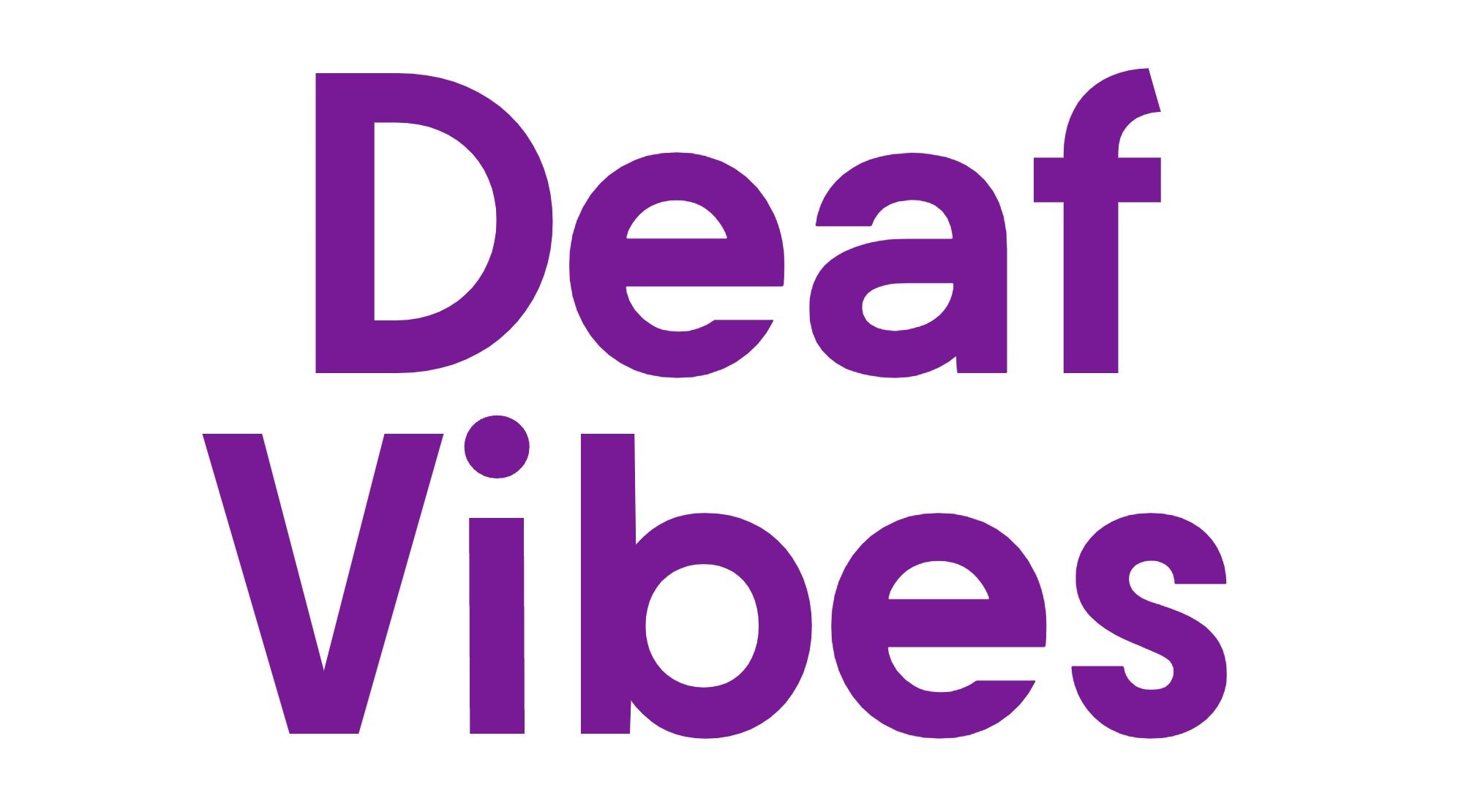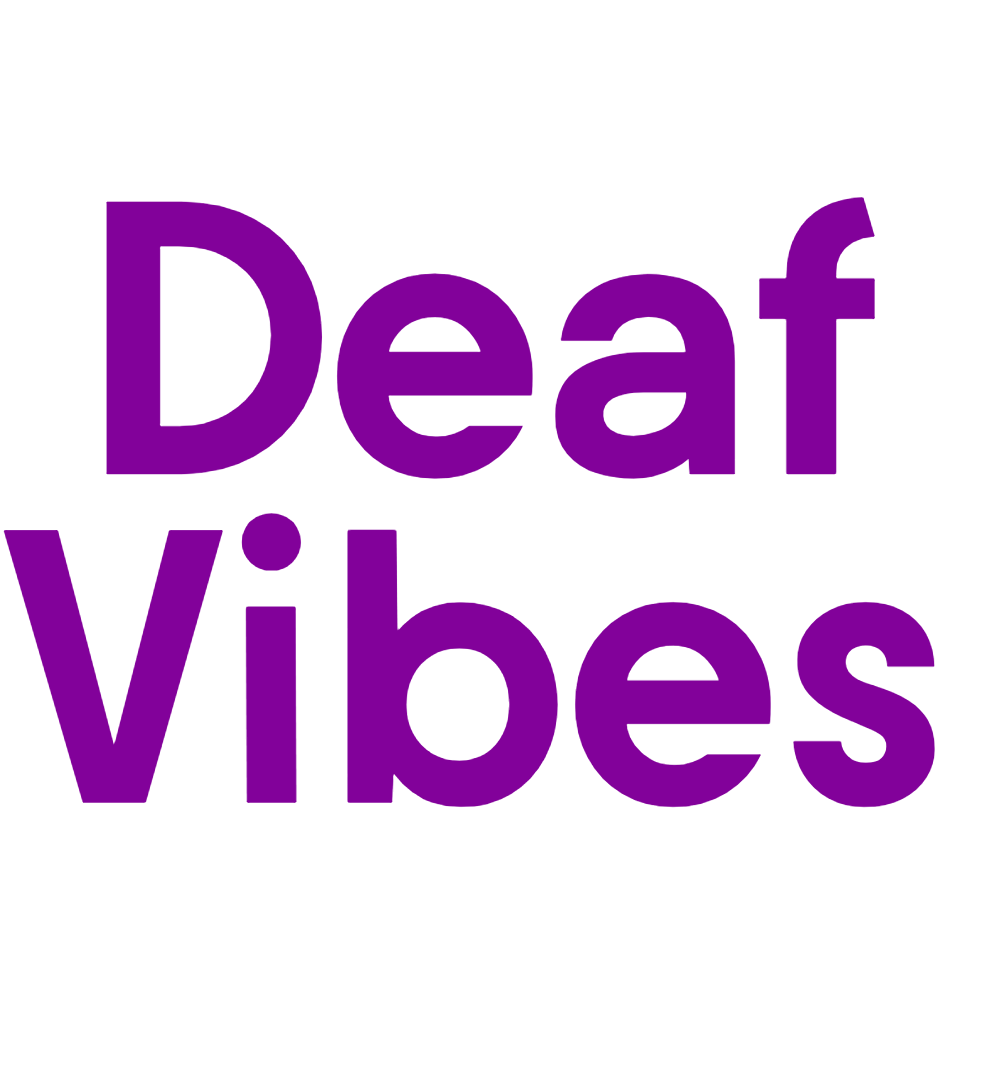Living with Hearing Loss
What Deaf-Friendly Services Does Your Church Offer?
Curious about the Deaf-friendly services at our church? Learn how we ensure inclusivity and participation for all members of our congregation.
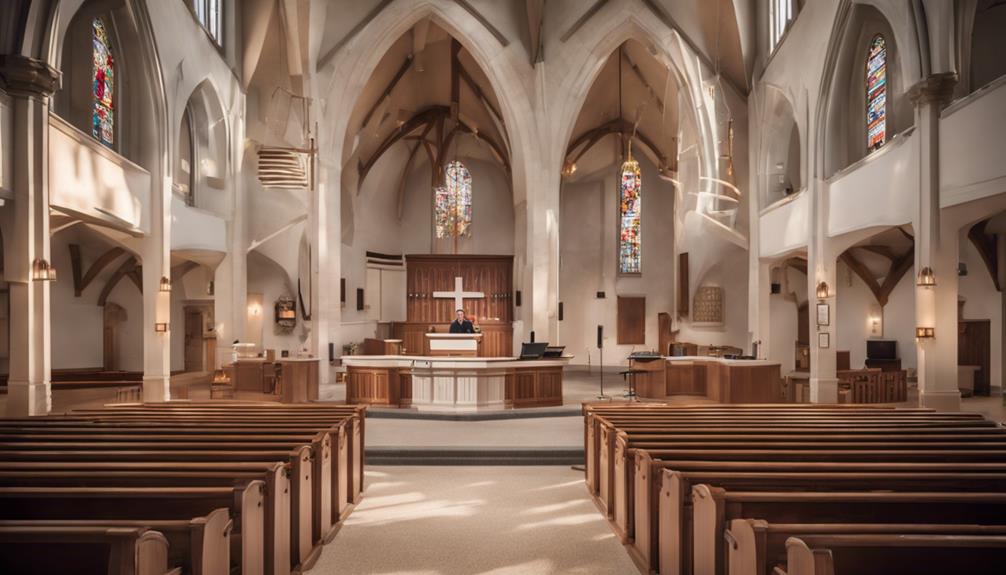
In our church, we make it a priority to ensure every member of our congregation feels valued and included. The introduction of Deaf-friendly services in our community has received a warm reception and heartfelt thanks from those we aim to serve.
From ASL interpreters during services to tailored youth programs, we are committed to fostering an environment where everyone can fully participate and engage.
Curious to learn more about the specific initiatives we have in place to cater to the Deaf community?
Key Takeaways
- Sign Language Interpretation Services with consistent availability and ongoing training
- Accessibility Measures like Closed Captioning and Hearing Loop System
- Deaf Ministry Programs offering Sign Language Classes and Interpreter Availability
- Community Engagement through Outreach Events, Workshops, Youth Programs, and Volunteer Opportunities
Importance of Deaf-Friendly Services
In our church community, recognizing the importance of Deaf-friendly services is fundamental to fostering inclusivity and accessibility for all members, including Deaf and hard of hearing individuals. Embracing the needs of the Deaf community through initiatives like sign language interpretation and tailored resources is at the core of our Deaf ministry. By offering services that cater to diverse communication styles, such as visual aids and written scripts, we aim to enhance the worship experience for everyone, ensuring equal participation and understanding.
Creating a Deaf-friendly environment goes beyond just providing basic accommodations; it signifies a deeper commitment to diversity, empathy, and embracing the unique perspectives that each member brings. Through live interpretation services and the utilization of hearing augmentation technologies, we bridge communication gaps and cultivate a space where all individuals feel valued, included, and heard. Ultimately, our dedication to Deaf-friendly services not only fosters a sense of community but also promotes spiritual fulfillment and belonging for Deaf individuals within our congregation.
Sign Language Interpretation Services
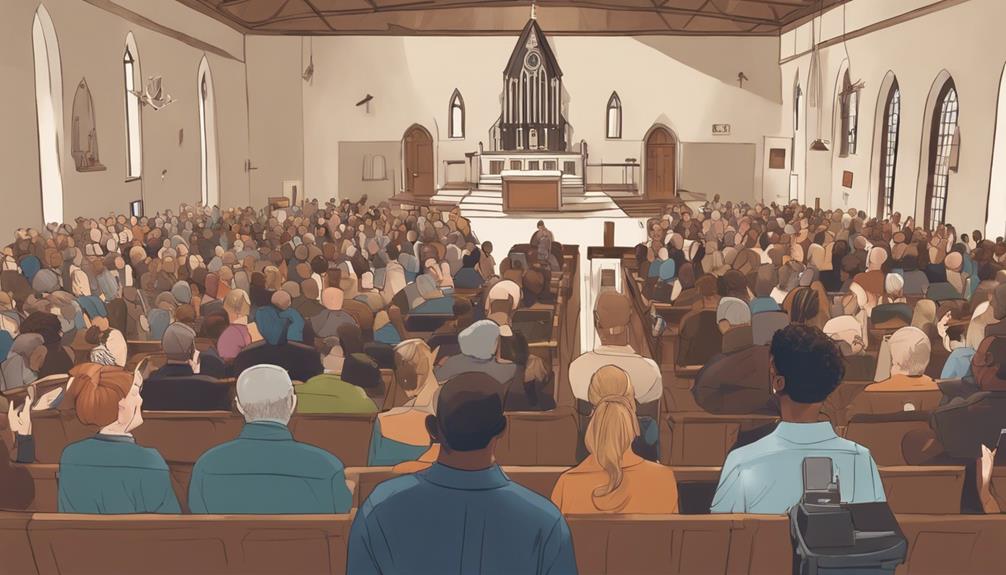
We believe that ensuring a consistent interpreter availability schedule, offering ongoing training for interpreters, and seeking feedback from the Deaf congregation are vital steps in enhancing sign language interpretation services at our church. These points contribute to the effectiveness and quality of interpretation, creating a more welcoming and inclusive environment for all individuals.
Interpreter Availability Schedule
Ensuring consistent accessibility, our church maintains a set schedule for ASL interpreters to be present during Sunday services and key events. This schedule allows our Deaf community members to participate fully in our services and activities.
By providing advance notice of interpreter availability, we empower Deaf and hard of hearing individuals to engage in church events with ease and confidence. Our commitment to inclusion is evident in the proactive communication of interpreter schedules through church announcements, bulletins, and online platforms.
We recognize the importance of reliable interpreter services in creating a welcoming environment for all. This structured approach not only demonstrates our dedication to accessibility but also fosters a sense of belonging and community among individuals with varying hearing abilities.
Training for Interpreters
Our church values the importance of comprehensive training for interpreters in sign language interpretation services, encompassing ASL grammar, vocabulary, and cultural sensitivity. Deaf people rely on skilled interpreters for accurate and effective communication during services. Training programs include certification courses and continuous professional development to ensure interpreters stay updated on best practices. Workshops, seminars, and resources are provided to support interpreter training. Below is an overview of the key components covered in interpreter training:
| Training Components | Description | Importance |
|---|---|---|
| ASL Grammar | Understanding the structure and rules of ASL | Crucial for fluency |
| Vocabulary | Learning signs and expressions in ASL | Enhances communication |
| Cultural Sensitivity | Awareness of Deaf culture and norms | Promotes inclusive environment |
Feedback From Deaf Congregation
Recognizing the profound impact of sign language interpretation services on the spiritual experience of our Deaf congregation, we've gathered valuable feedback to enhance the inclusivity and accessibility of our worship services.
Deaf congregation members express immense gratitude for the presence of ASL interpreters during our church services, emphasizing how these services significantly enhance their participation and connection with the spiritual content. The feedback from our Deaf community highlights the positive influence of sign language interpretation on their overall spiritual experience, underlining the importance of offering such services to ensure everyone can engage fully in our worship gatherings.
ASL interpreters are instrumental in fostering clear communication and understanding, playing a pivotal role in creating a welcoming and inclusive environment for all worshippers.
Closed Captioning for Sermons
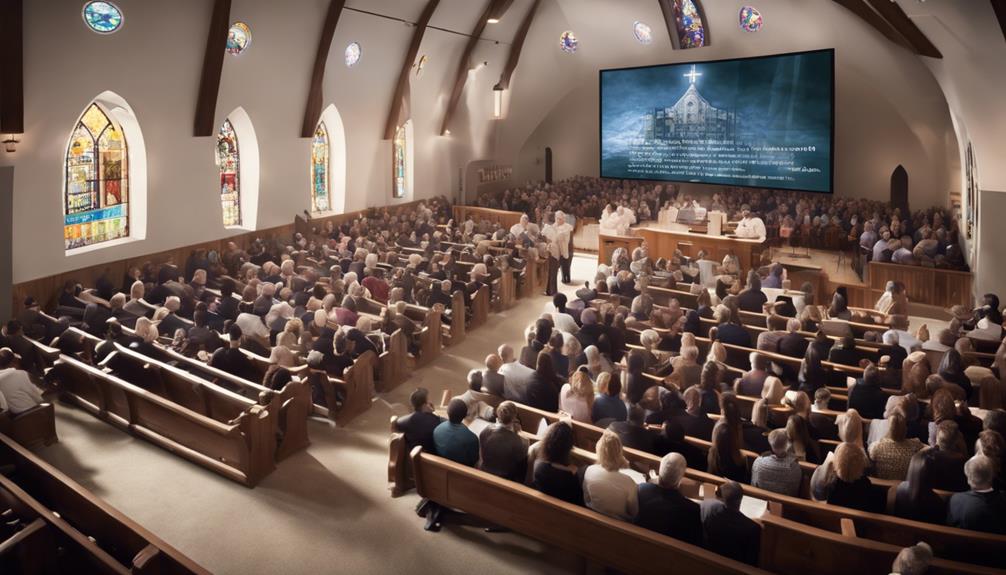
Closed captioning for sermons is a vital accessibility feature that enriches the worship experience for Deaf and hard of hearing individuals. It allows everyone to follow along with the sermon content in real-time, enhancing the inclusivity of church services. By projecting captions onto screens, congregants who rely on this service can fully participate and engage with the message being shared. Churches that offer closed captioning show a commitment to accommodating diverse communication needs within their community. This innovative approach not only benefits those with hearing impairments but also improves understanding and engagement for all members of the congregation.
| Benefits of Closed Captioning for Sermons | |||
|---|---|---|---|
| Enhances inclusivity | Allows real-time following of sermon content | Improves engagement and understanding | Demonstrates commitment to accessibility |
Assistive Listening Devices Available
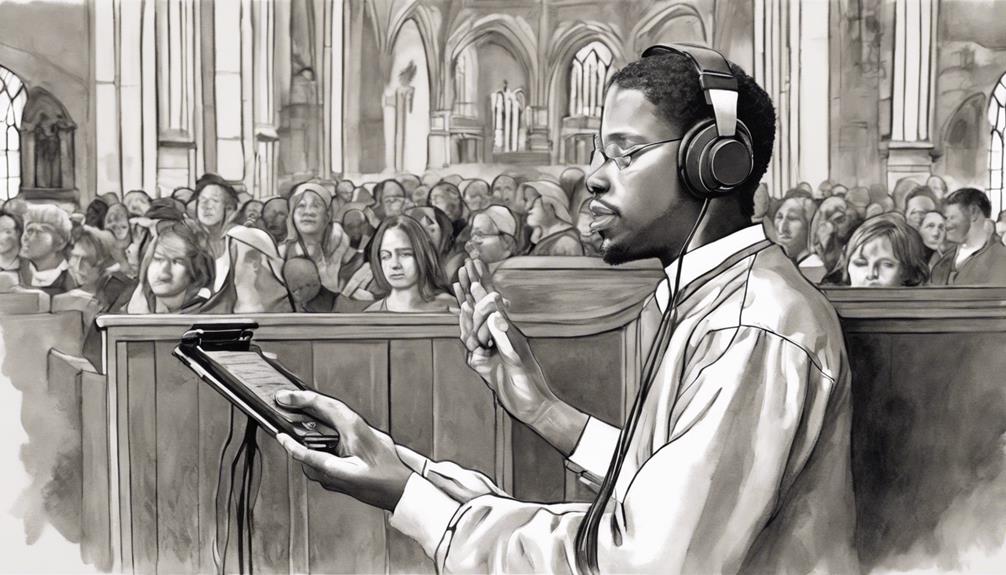
Upon entering our church, visitors will find a range of Assistive Listening Devices available to enhance their worship experience, catering to individuals with hearing impairments. These devices, endorsed by the Association of the Deaf, are an essential part of our commitment to inclusivity and accessibility.
Here are three key features of our Assistive Listening Devices:
- Cutting-Edge Technology: Our ALDs are equipped with top-of-the-line microphones and transmitters that seamlessly integrate with our sound system, ensuring that every word spoken during the service is crystal clear for individuals with hearing impairments.
- Borrowing Options: We offer these devices for borrowing during services, allowing hard of hearing individuals to actively participate in the worship experience without missing a beat. This service is provided at no additional cost to ensure everyone can engage fully.
- Maintenance and Hygiene: The initial cost of our ALDs covers hardware and maintenance, guaranteeing ongoing accessibility for our congregation. Additionally, we prioritize hygiene by cleaning the devices after each use to maintain optimal performance and comfort for all users.
Deaf Ministry Programs
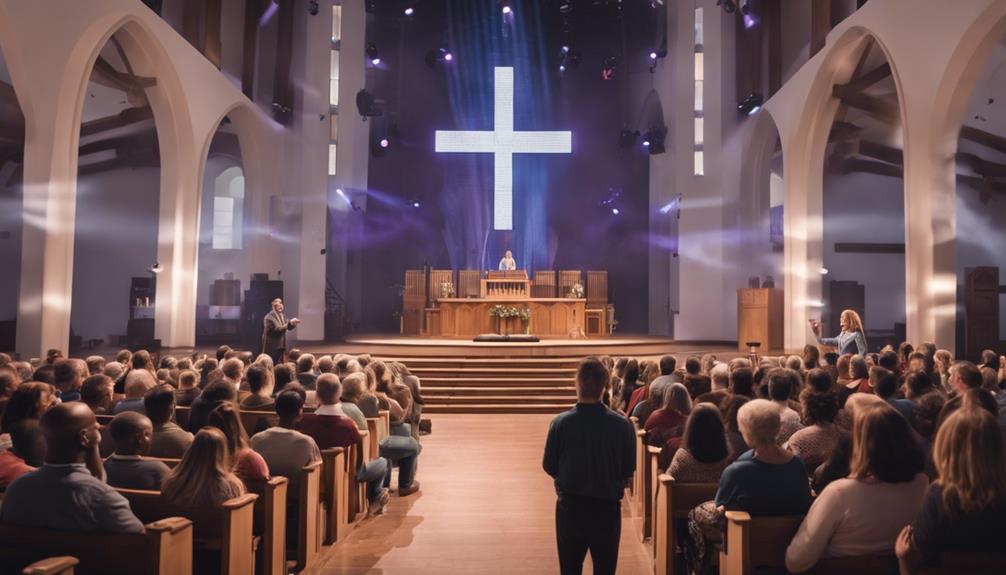
We pride ourselves on offering a range of Deaf ministry programs that cater to the needs of our community.
From sign language classes to regular interpreter availability, we ensure that our services are accessible and inclusive.
Our commitment to providing Deaf-friendly worship services and social events reflects our dedication to fostering a welcoming environment for all.
Sign Language Classes
Participants in our church's Deaf Ministry programs engage in structured sign language classes to enhance their communication skills with the Deaf community.
- Our sign language classes cover basic to advanced skills for effective communication.
- Experienced instructors provide personalized attention and feedback.
- Participants have reported improved communication within and outside the church community.
These classes are designed to promote inclusivity and understanding among our congregation members. By offering these classes, we aim to create a welcoming environment where everyone can communicate effectively and engage meaningfully with one another. Join us in learning the language of inclusion and connection through our sign language classes in the Deaf Ministry programs.
Interpreter Availability
Ensuring consistent availability of skilled interpreters is paramount for fostering a Deaf-friendly environment and promoting inclusive worship experiences in our church's Deaf Ministry Programs. In the United States, Deaf Ministry Programs prioritize providing qualified ASL interpreters during services to facilitate full participation for Deaf individuals.
Whether through dedicated volunteers or paid professionals, interpreter availability is essential for creating an inclusive space where everyone can engage in worship. To support the valuable service of interpreters, considerations are made for offering honorariums.
Maintaining a standard of quality in ASL interpretation underscores the significance of reliable and continuous interpreter availability. By prioritizing this aspect, we aim to enhance the accessibility and richness of our Deaf Ministry Programs.
Deaf-Friendly Worship Music
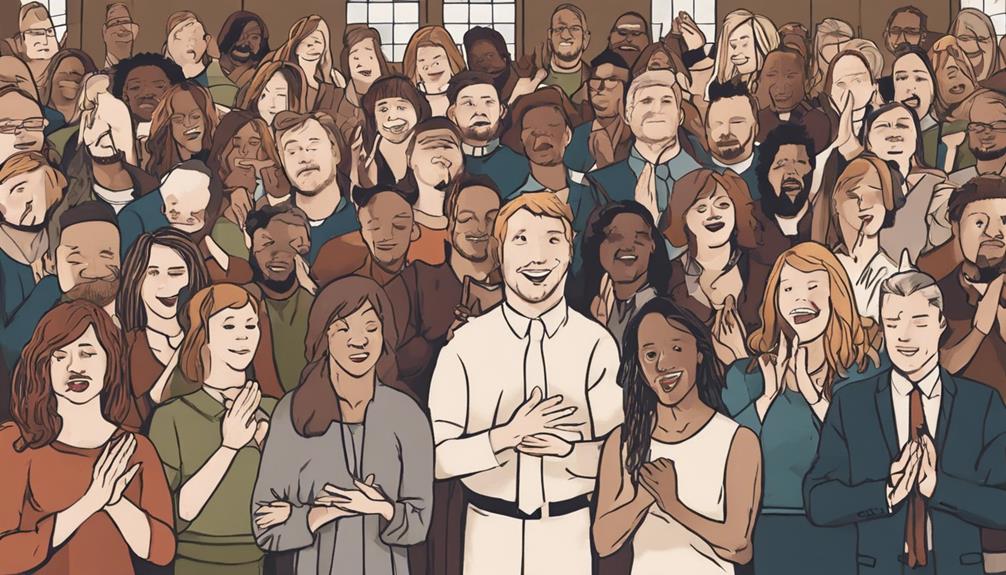
Incorporating Deaf-friendly worship music enhances the inclusivity and richness of the worship experience for all members of the congregation. When considering how to make worship music more accessible to Deaf and hard of hearing people, churches can offer a brief guide on creating a welcoming environment through music. Here are three key elements to consider:
- Use of Sign Language and ASL Poetry: Incorporating sign language and ASL poetry into worship music can add depth and meaning to the songs being performed. This visual representation allows Deaf individuals to engage more fully with the music and feel included in the worship experience.
- Visual Arts Integration: Visual arts, such as projected lyrics, artwork, or videos that complement the music, can enhance the worship service for Deaf attendees. This multi-sensory approach creates a more immersive experience that caters to both auditory and visual senses.
- ASL Choir Performances: Having a choir that signs hymns or songs in ASL can be a powerful way to involve Deaf members in the music ministry. It not only showcases the beauty of sign language but also fosters a sense of community and unity among all worshippers.
Deaf Community Outreach Events
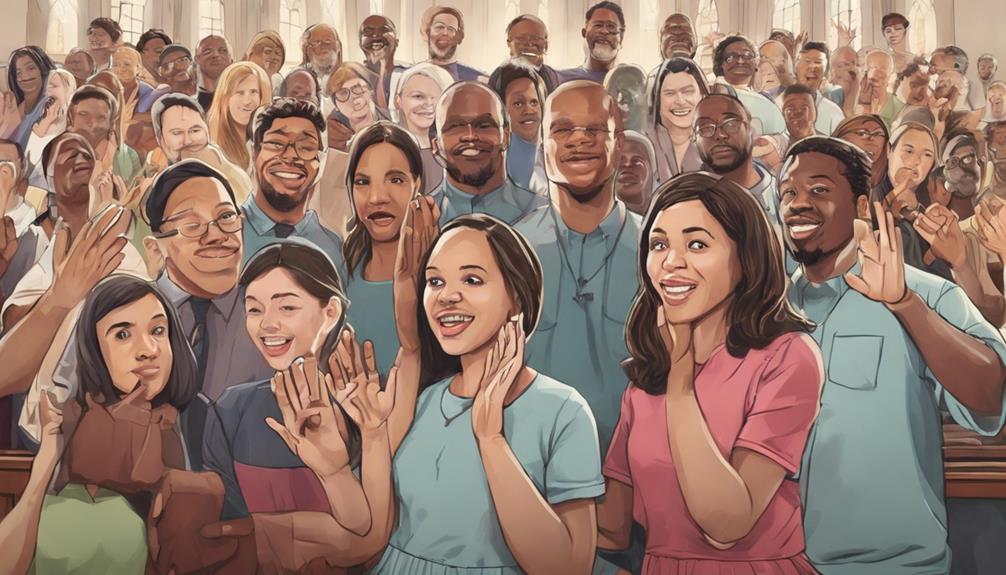
To further embrace and support the Deaf community, our church actively organizes engaging outreach events that aim to foster a deeper connection and understanding among all members of our congregation. These events provide hard opportunities for Deaf individuals to actively engage with the church, fostering inclusivity and support.
We host a variety of activities, including sign language workshops, Deaf culture awareness sessions, and social gatherings that cater to the unique needs and interests of the Deaf community. Through these outreach events, we showcase our dedication to serving and connecting with the Deaf population, creating a welcoming environment where everyone feels valued and respected.
Deaf Awareness Workshops
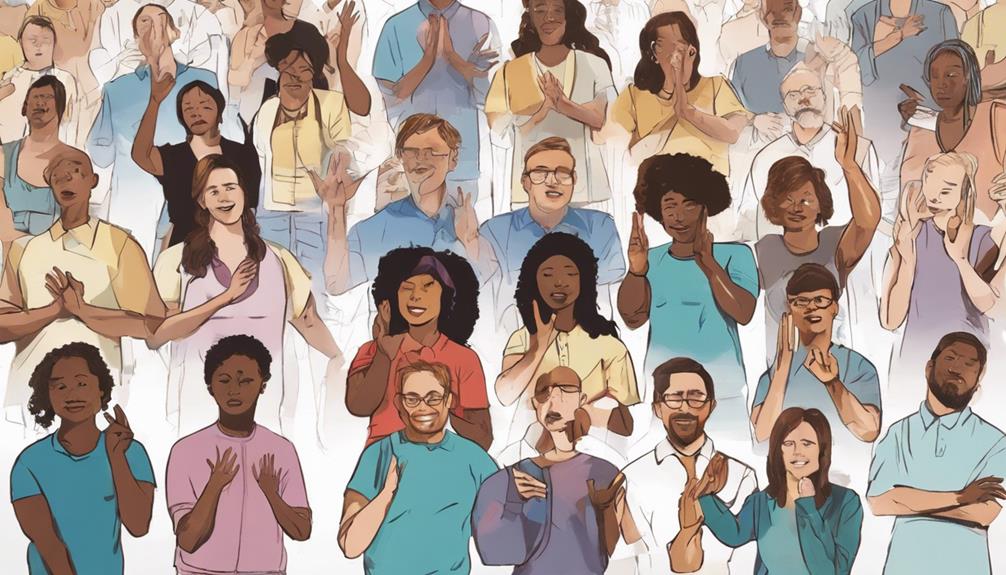
Deaf Awareness Workshops offer valuable insights into Deaf culture, communication methods, and inclusion strategies to enrich our church community's understanding and support for individuals who are Deaf or hard of hearing.
- Sign Language Basics: Participants in these workshops can learn fundamental sign language skills to better communicate with Deaf individuals, fostering a more inclusive environment.
- Deaf History: Understanding the rich history of the Deaf community helps dispel misconceptions and promotes respect for diverse cultural backgrounds.
- Promoting Accessibility: Workshops provide practical guidance on making church services and events more accessible, such as by incorporating captioning services or ensuring proper lighting for lip-reading.
ASL Classes for Members

At our church, we're excited to offer American Sign Language (ASL) classes for members looking to enhance their communication skills.
These classes provide a valuable opportunity for us to improve interactions with Deaf and hard of hearing individuals in our community.
We believe that participating in structured ASL lessons can help create a more inclusive and understanding environment within our congregation.
ASL Class Schedule
Every Sunday morning before service, our church offers ASL classes for members facilitated by a certified instructor experienced in Deaf culture. These classes provide a valuable opportunity for our community to learn and engage with American Sign Language.
Here's what you can expect from our ASL class schedule:
- Structured Learning: Members can participate in structured lessons covering basic ASL vocabulary.
- Grammar Instruction: Our classes also focus on teaching the grammar rules of ASL to enhance communication skills.
- Conversational Practice: Participants engage in conversational practice to apply their knowledge in real-life scenarios.
Join us to not only learn ASL but also to foster a more inclusive and connected community.
Instructor Qualifications
Led by a certified ASL instructor with over 15 years of experience, our church's ASL classes for members prioritize high-quality instruction and inclusivity.
Sarita Fowler, our dedicated instructor, not only holds a ThM degree but is also nationally certified in ASL and Spanish. With her background as a Spanish professor, Sarita brings a unique perspective to our classes, enriching the learning experience for our members. Her qualifications ensure that members receive top-notch instruction and support as they delve into the world of American Sign Language.
Member Participation Opportunities
With our ASL classes for members, we aim to empower individuals to engage fully within our church community by fostering effective communication with Deaf individuals.
- Members learn basic ASL skills to interact with Deaf and hard of hearing individuals during church activities and services.
- These classes enhance member participation, promoting unity and understanding among our church family.
- Participation in ASL classes signifies a dedication to inclusivity and accessibility within our community.
Deaf-Friendly Communication Resources
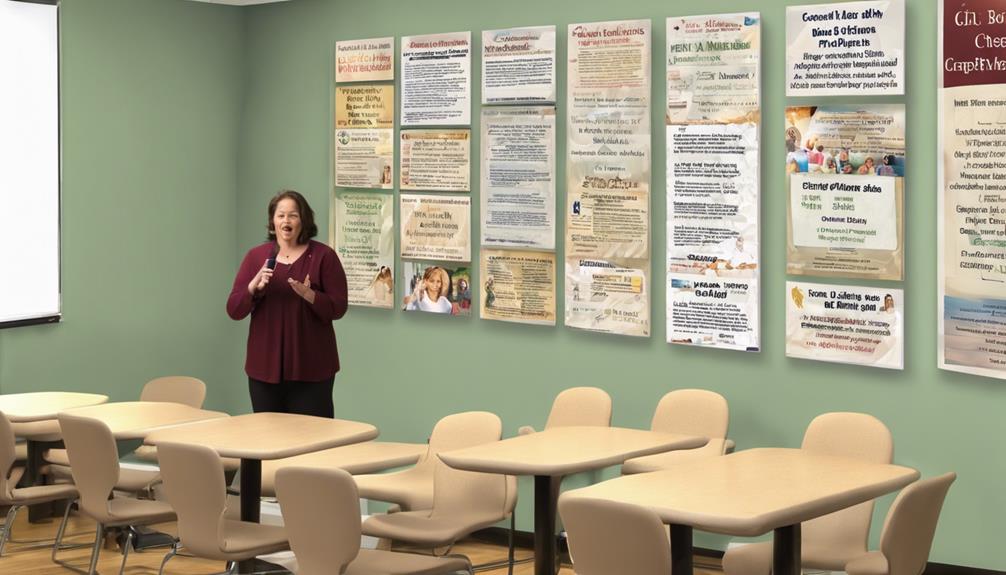
Utilizing a variety of communication resources in church settings is crucial for effective communication with the Deaf community. Written communication methods, such as pre-written scripts and manuscripts, play a vital role in providing accessibility. Live interpretation services with ASL interpreters on stage help bridge the communication gap and make services inclusive.
Hearing augmentation technologies, like Assistive Listening Devices (ALDs), cater to hard of hearing individuals, ensuring active engagement during services. Innovative solutions, such as spf.io, offer live captioning, enhancing church accessibility initiatives further. Deaf-friendly worship practices go beyond basic communication, incorporating sign language, visual elements, and providing accessible resources to create an inclusive environment where everyone can participate fully.
Accessibility Accommodations in Church Facilities
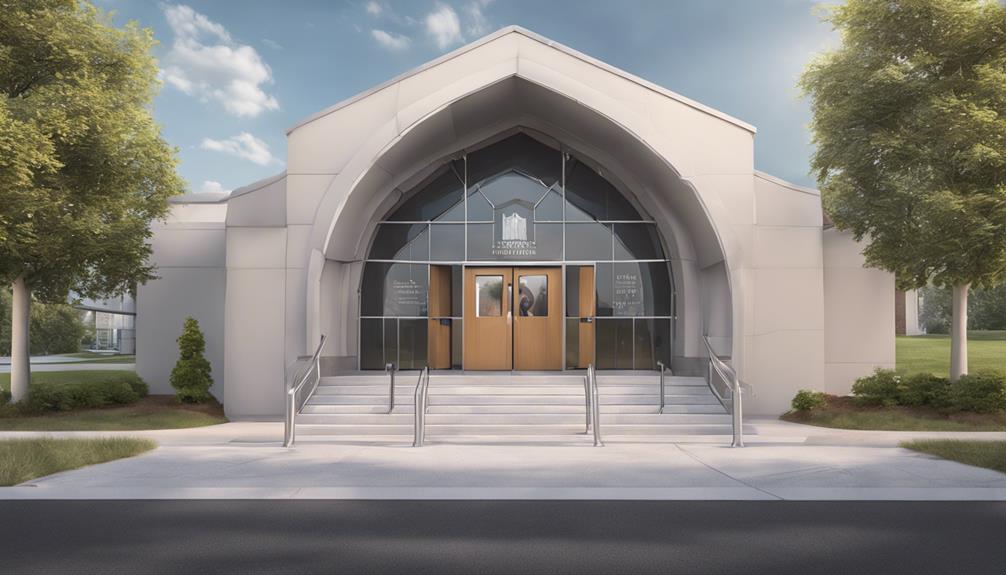
At our church, we prioritize accessibility for all individuals, including those with hearing impairments.
We offer services like sign language interpreters and a hearing loop system to ensure everyone can fully participate in worship and gatherings.
These accommodations aim to create an inclusive and welcoming environment for all members of our community.
Sign Language Interpreters
Our church ensures accessibility for Deaf and hard of hearing individuals through the provision of skilled sign language interpreters positioned strategically during key elements of our services. This commitment to inclusivity allows all members of our congregation to engage fully in the worship experience. The use of sign language interpreters not only promotes understanding but also fosters a sense of community where everyone feels valued and welcomed. By having interpreters for crucial components such as sermons, prayers, and worship songs, we ensure that no one is left out during our gatherings. We prioritize the presence of well-trained interpreters to guarantee that Deaf attendees can participate effortlessly.
- Skilled interpreters are strategically positioned for clear communication.
- Interpreters facilitate understanding during important service elements.
- Inclusivity and community are fostered through sign language interpretation.
Hearing Loop System
Implementing a hearing loop system in our church facilities ensures seamless audio transmission directly to compatible hearing devices, enhancing the worship experience for individuals with hearing impairments. This technology helps reduce background noise, delivering improved sound quality to those with hearing loss. By offering compatibility with T-coil equipped hearing aids and cochlear implants, our church embraces inclusivity and accessibility for all worshippers. The commitment to installing hearing loop systems showcases a dedication to innovation in accommodating diverse needs within our community. Worshippers with hearing impairments can now participate fully in services, feeling connected and engaged. This technology not only meets accessibility standards but also fosters a sense of belonging and togetherness in our church family.
| Benefits of Hearing Loop System | ||
|---|---|---|
| Seamless audio transmission | Enhanced sound quality | Reduced background noise |
| Compatible with T-coil devices | Improved worship experience | Commitment to inclusivity |
Deaf-Friendly Youth Programs
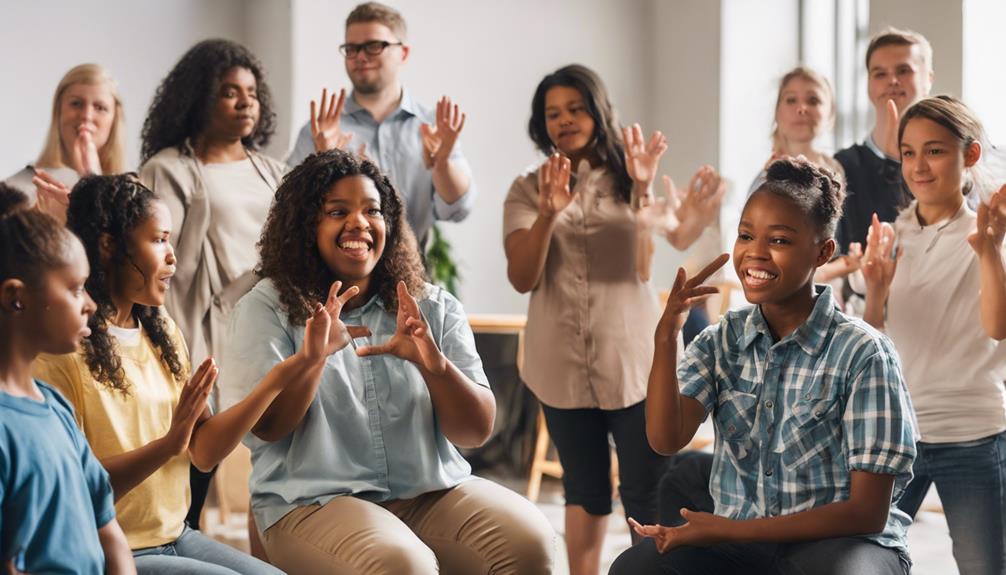
Ensuring that Deaf-friendly youth programs at churches cater to the unique needs of Deaf children and teenagers is paramount for fostering an inclusive and supportive environment.
- Incorporating Sign Language: Deaf-friendly youth programs often incorporate sign language into their activities, ensuring Deaf participants can fully engage and communicate.
- Visual Aids and Deaf Culture: These programs make use of visual aids and embrace Deaf culture to create an inclusive atmosphere that celebrates diversity.
- Interactive Bible Studies: Youth activities may include ASL lessons, Deaf-led worship, and interactive Bible studies conducted in sign language. These initiatives not only nurture spiritual growth but also promote a sense of belonging and community among Deaf youth.
Inclusive Bible Study Groups
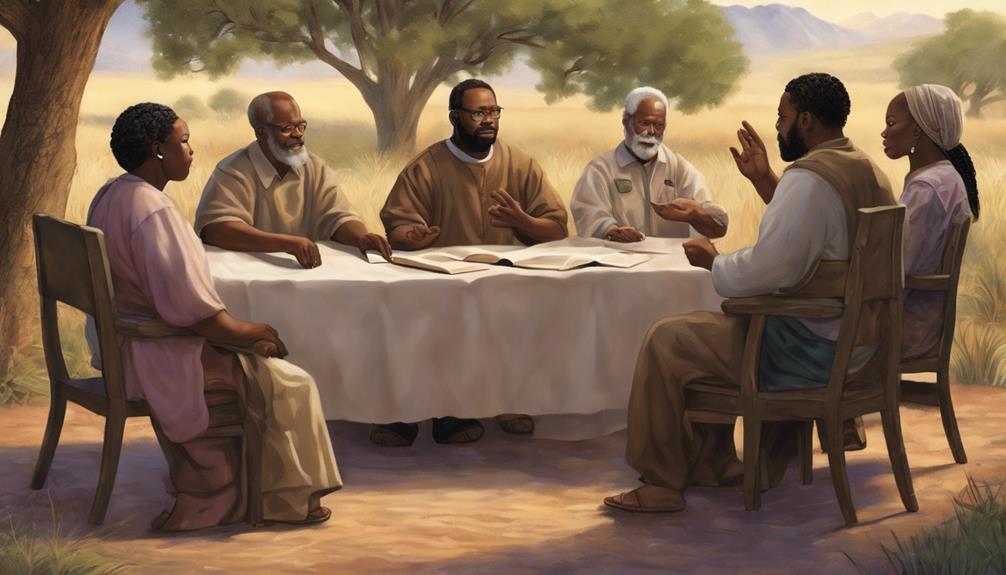
To further cultivate a welcoming and accessible church environment, inclusive Bible study groups are vital for accommodating the diverse communication needs of Deaf and hard of hearing individuals. These groups go beyond just providing a space for study; they offer accessible resources such as American Sign Language (ASL) interpretation and written materials, ensuring that all participants can fully engage in discussions and spiritual growth. By promoting inclusivity and understanding of diverse communication needs, these Deaf-friendly Bible study groups create a supportive environment where everyone can feel valued and included.
Participants in these inclusive groups have the opportunity to delve into meaningful discussions and deepen their spiritual understanding without communication barriers. This commitment to accessibility and inclusion in religious education not only enriches the experiences of Deaf and hard of hearing individuals but also fosters a sense of community within the church. Inclusive Bible study groups exemplify a dedication to ensuring that everyone can participate fully in the church's teachings and activities.
Deaf-Friendly Volunteer Opportunities
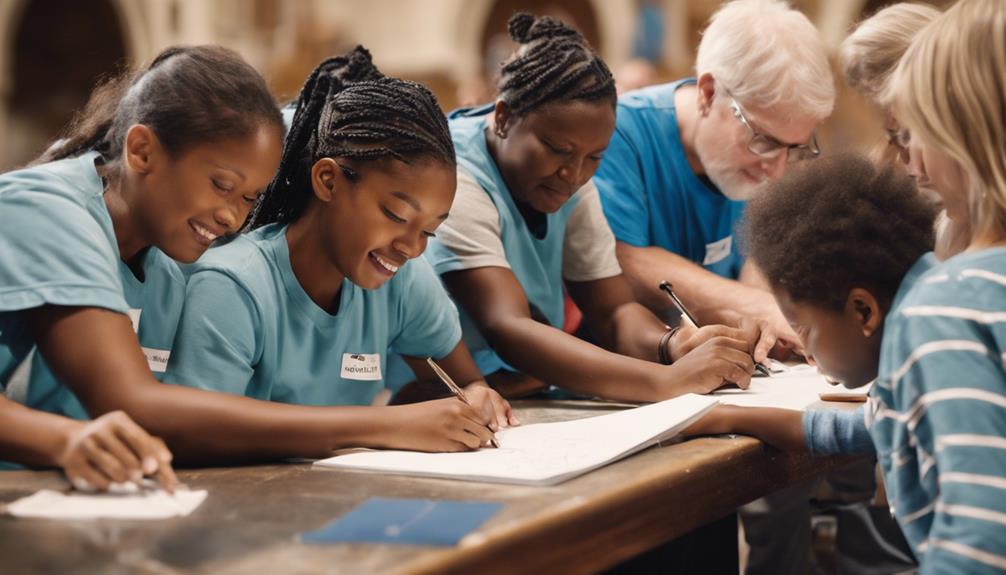
Volunteers play a crucial role in creating a welcoming and accessible church environment for Deaf and hard of hearing individuals through a variety of Deaf-friendly opportunities.
- ASL Interpretation: Offering ASL interpretation during services can greatly enhance the worship experience for Deaf individuals, ensuring they have full access to the message being shared.
- Technology Assistance: Volunteers can assist in implementing and maintaining technology-based solutions that enhance accessibility, such as hearing loops or captioning systems, making it easier for Deaf individuals to engage with church activities.
- Written Communication Support: Volunteers can help create and distribute written materials in accessible formats, such as providing bulletins in advance or offering digital copies of sermons, ensuring Deaf individuals can follow along and stay connected with the community.
Collaboration With Deaf Organizations
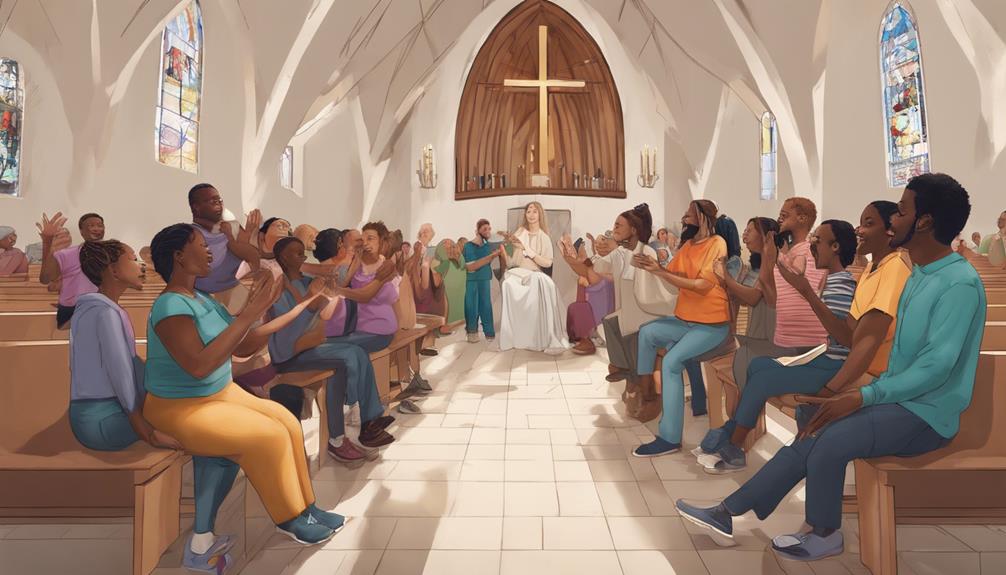
Collaborating with Deaf organizations enriches our church community by providing valuable resources and insights for creating deaf-friendly services. These partnerships offer a deep understanding of Deaf culture, communication methods, and accessibility needs, enhancing our ability to cater to the Deaf individuals in our congregation.
By working closely with Deaf organizations, we can ensure that our services are inclusive and supportive of the Deaf community's unique requirements. Their expertise helps us tailor our programs and events to better meet the needs of Deaf individuals, fostering a more welcoming and accessible environment within our church.
Through these collaborations, we gain access to best practices and strategies that enable us to innovate and continually improve our efforts in creating a truly deaf-friendly space. Embracing these partnerships not only benefits the Deaf members of our community but also enriches the overall church experience for everyone.
Frequently Asked Questions
How Do Deaf People Attend Church?
We understand the importance of ensuring Deaf individuals can fully participate in church services. Accessible communication methods like sign language interpreters and visual aids play a crucial role in enabling Deaf people to attend services.
What Can We Do to Help the Deaf Community?
To help the deaf community, we can promote awareness, provide resources, and create inclusive environments.
By offering sign language classes, captioning videos, and ensuring visual access in all activities, we can support deaf individuals in various settings.
It's crucial to listen to their needs, involve them in decision-making, and continuously educate ourselves on deaf culture and accessibility.
Together, we can foster a more inclusive and supportive community for everyone.
How Can Churches and Other Organizations Be More Accessible to People Who Are Deaf or Hard of Hearing?
When considering how churches and organizations can be more accessible to the Deaf and hard of hearing, it's crucial to prioritize inclusivity. By displaying text announcements, utilizing ASL interpreters, and offering Assistive Listening Devices, we can enhance accessibility.
Additionally, having pastors face the congregation for lip-reading can greatly improve communication. Providing resources like free PDFs further supports the inclusion of Deaf individuals, fostering a welcoming and inclusive environment for all.
What Is the Meaning of Deaf Services?
Deaf services encompass a range of accommodations and practices tailored to meet the needs of Deaf and hard of hearing individuals during worship. These services prioritize inclusivity, communication access, and creating a welcoming environment for all worshippers.
Conclusion
In conclusion, our church strives to be inclusive and welcoming to the Deaf community by offering a variety of Deaf-friendly services. By providing sign language interpretation, closed captioning, assistive listening devices, and Deaf ministry programs, we aim to create a worship environment that's accessible to all.
Together, we can continue to work towards breaking down barriers and building a truly inclusive community where everyone feels valued and heard. Let's sign, listen, and worship together in unity.
Jamie is one of the creative forces behind the words that resonate with our audience at Deaf Vibes. With a passion for storytelling and advocacy, Jamie delves into topics that matter deeply to the deaf and hard-of-hearing community. Jamie’s articles are crafted with empathy, insight, and a commitment to positive change, from exploring the latest advancements in hearing technologies to shedding light on the everyday challenges and victories of those within the community. Jamie believes in the power of shared stories to inspire action, foster understanding, and create a more inclusive world for everyone.
Living with Hearing Loss
Top Online Deaf and Hard of Hearing Credential Programs in California
Unveil the innovative and impactful online Deaf and Hard of Hearing credential programs at California State University, Fresno, shaping the future of education.
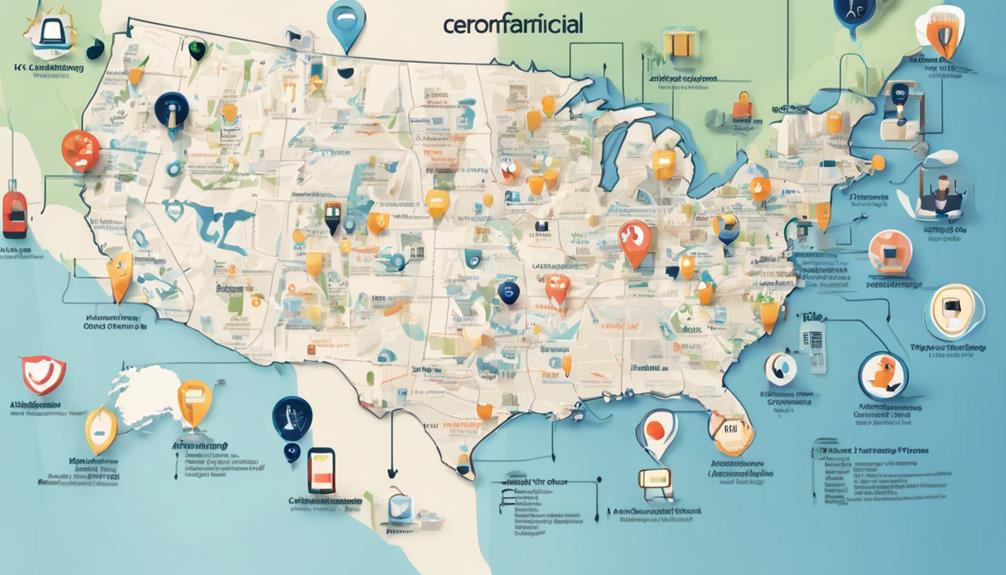
Ever wondered where to find the crème de la crème of online Deaf and Hard of Hearing credential programs in California?
Well, look no further as we uncover the key players in this educational realm.
From the innovative approaches at California State University, Fresno, to the unique bilingual/bicultural emphasis and support for individualized programs, these programs are shaping the future of Deaf Education.
Stay tuned to discover how these programs are making a significant impact in the field and paving the way for a more inclusive educational landscape.
Key Takeaways
- Online programs at CSU Fresno offer specialized training in Deaf Education with emphasis on bilingual/bicultural approaches.
- Career opportunities include roles as special education teachers supporting DHH students in language and communication skills.
- Programs prioritize ASL proficiency, providing a holistic approach to Deaf Education in inclusive settings.
- Generous education grants totaling $1.25 million over 5 years support 55 graduate scholars in California.
Deaf Education Graduate Program
We're excited to introduce the Deaf Education Graduate Program at CSU Fresno, a 36-unit online program accredited by the Council on Education of the Deaf. This program is tailored for individuals passionate about Deaf Education and supporting Deaf/Hard of Hearing students. The emphasis on a bilingual/bicultural approach sets us apart, ensuring graduates are equipped with the necessary skills to excel in this field.
Students admitted to our program from Fall 2020 onwards will delve into a comprehensive curriculum focusing on Deaf Education. Through our partnership with the Kremen School of Education, we encourage students to pursue a master's degree along with a teaching credential, paving the way for a fulfilling career in this specialized area. Communication competence in American Sign Language is a core requirement, underlining our commitment to preparing educators who can effectively connect with Deaf/Hard of Hearing individuals.
With distinguished faculty members like Ellen Schneiderman and Rachel Friedman Narr, who are experts in Deaf Education, students receive unparalleled support and guidance, setting them up for success in the dynamic field of Deaf Education.
Deaf & Hard of Hearing Credential
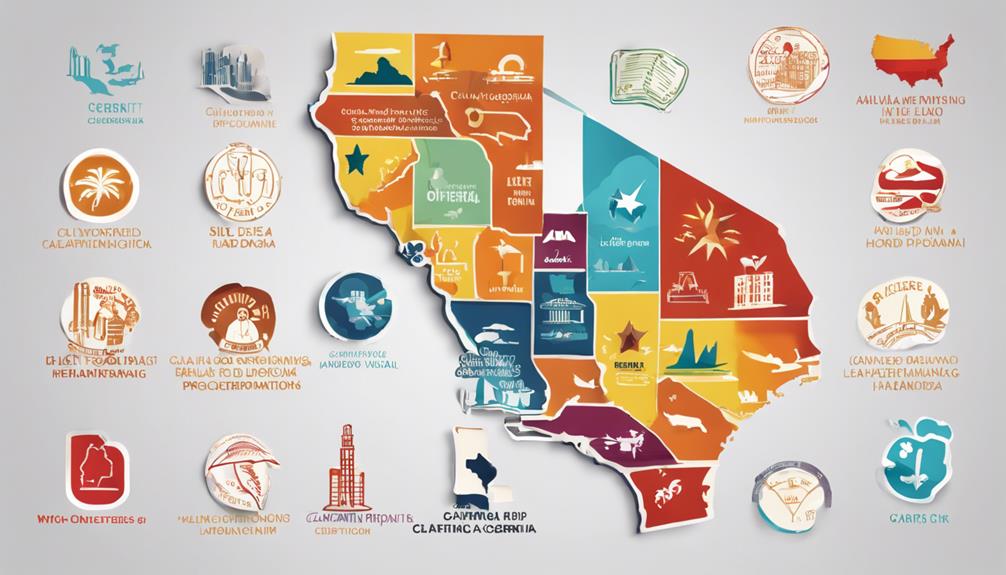
As we consider the Deaf & Hard of Hearing Credential program in California, it's essential to understand the training requirements and the career opportunities it offers.
This specialized program equips educators with the skills needed to support students with hearing impairments through coursework in American Sign Language and Deaf Education.
Graduates can pursue a Preliminary or Clear Teaching Credential in Deaf/Hard of Hearing, opening doors to impactful careers in the field.
Training Requirements
During the Deaf and Hard of Hearing (DHH) Credential program in California, educators undergo specialized training that includes coursework in DHH specialization, ASL proficiency, and subject matter qualifications. Candidates are required to complete internships or student teaching to gain practical experience working with DHH students.
The program emphasizes bilingual/bicultural approaches and individualized placement strategies tailored to the needs of DHH learners. Successful completion of the training leads to the attainment of a Preliminary DHH Credential in California.
This comprehensive preparation equips educators with the necessary skills and knowledge to support DHH students effectively in educational settings. The emphasis on ASL proficiency ensures that educators can communicate fluently with their students, fostering a more inclusive and supportive learning environment.
Career Opportunities
Exploring career opportunities with a Deaf and Hard of Hearing Credential opens doors to impactful roles as special education teachers in various educational settings. With this credential, individuals can work in inclusive classrooms, resource specialist programs, or designated DHH programs.
The ability to support DHH students in developing language and communication skills, academic achievement, and social integration is key to these roles. Professionals with this credential may find themselves collaborating with speech-language pathologists, audiologists, and other specialists to create comprehensive educational plans for DHH students.
Working in both public and private educational settings allows for a diverse range of experiences and the chance to make a significant difference in the lives of students with unique needs.
Special Education: Deaf & Hard of Hearing
When it comes to special education for the Deaf and Hard of Hearing, we focus on teaching communication strategies and implementing adaptive technology to enhance learning experiences.
These approaches help bridge the gap and create a supportive environment for students facing hearing challenges.
Teaching Communication Strategies
In preparing educators for working with students who are deaf and hard of hearing, our program prioritizes the development of tailored communication strategies that promote inclusive environments and support individual needs effectively.
- Sign Language Proficiency: Emphasis on mastering sign language to enhance communication.
- Adaptive Communication Skills: Teaching various strategies to address diverse communication needs.
- Inclusive Environment Creation: Focusing on building environments that support all students.
- Individualized Support: Providing personalized assistance to meet specific student requirements.
Through specialized coursework in communication approaches and assistive technologies, our graduates are well-equipped to teach and empower students with hearing loss effectively. Our commitment to innovative teaching methods ensures that educators can make a meaningful difference in the lives of students with hearing impairments.
Implementing Adaptive Technology
Implementing adaptive technology for students in Special Education who are Deaf and Hard of Hearing involves integrating tools like FM systems, cochlear implants, and captioning services to enhance communication and accessibility. As specialists in this field, we understand the crucial role adaptive technology plays in facilitating language development and academic success for DHH learners.
These innovative tools not only improve speech perception but also create a more inclusive learning environment. Educators and students require specialized training and ongoing support to effectively utilize adaptive technology in educational settings.
Preliminary Education Specialist Credential
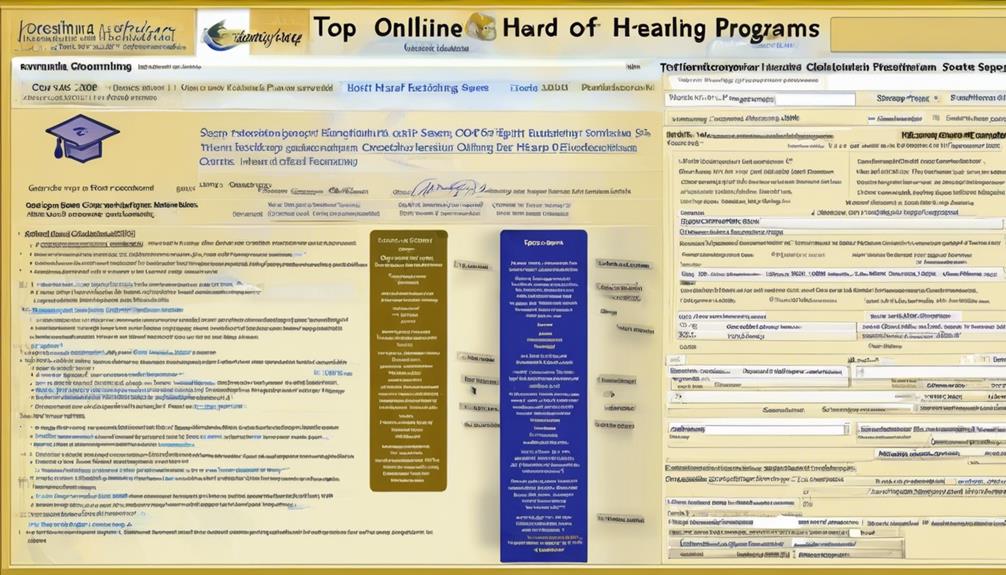
Throughout the Preliminary Education Specialist Credential program in Deaf/Hard of Hearing in California, candidates engage in a comprehensive 49-unit curriculum aimed at equipping them with the necessary skills and knowledge for supporting students with hearing impairments. The program includes supervised fieldwork practica and a requirement to pass the American Sign Language Proficiency Interview, ensuring educators are proficient in sign language to effectively communicate with hard of hearing students.
- Focused Curriculum: The 49-unit program covers a wide range of topics essential for understanding and addressing the needs of students with hearing impairments.
- Hands-On Experience: Candidates gain practical experience through supervised fieldwork practica, applying their learning in real-world educational settings.
- ASL Proficiency: Passing the ASL Proficiency Interview is a crucial component, ensuring educators have the necessary language skills to interact effectively with hard of hearing students.
- Comprehensive Assessment: The program evaluates candidates based on specific criteria to ensure they meet the standards required to support students with hearing impairments effectively.
Education Specialist Credential Program
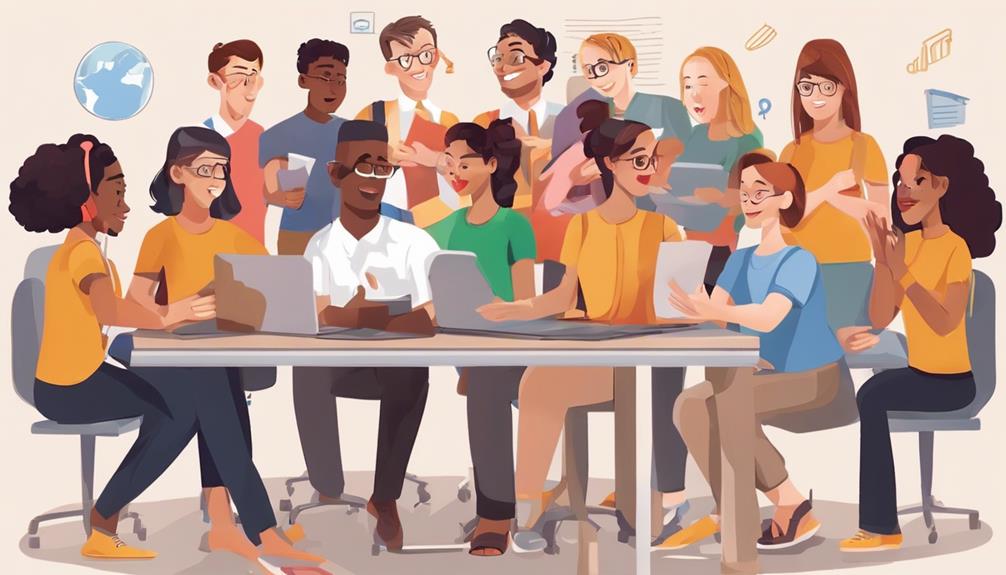
The Education Specialist Credential Program at California State University, Fresno equips aspiring educators with specialized training to support Deaf and Hard of Hearing (DHH) students. This program offers a comprehensive curriculum that combines Special Education coursework with a focus on Deaf/Hard of Hearing specialization, ensuring teachers are well-prepared to cater to the unique needs of this student population.
Students in the program have the option to choose between a Traditional Program or an Intern Program, allowing them to tailor their learning experience based on their current teaching status and career objectives. To successfully complete the program, students must fulfill specific course requirements, engage in fieldwork experiences, and demonstrate proficiency in American Sign Language through the ASL Proficiency Interview.
Graduates of this program earn a Preliminary Education Specialist Credential in Deaf/Hard of Hearing, qualifying them to work effectively with students who have hearing loss. The Education Specialist Credential Program at California State University, Fresno stands out as a valuable resource for teachers of Deaf and Hard of Hearing students, providing them with the necessary tools and knowledge for success in the field.
Deaf Studies Department
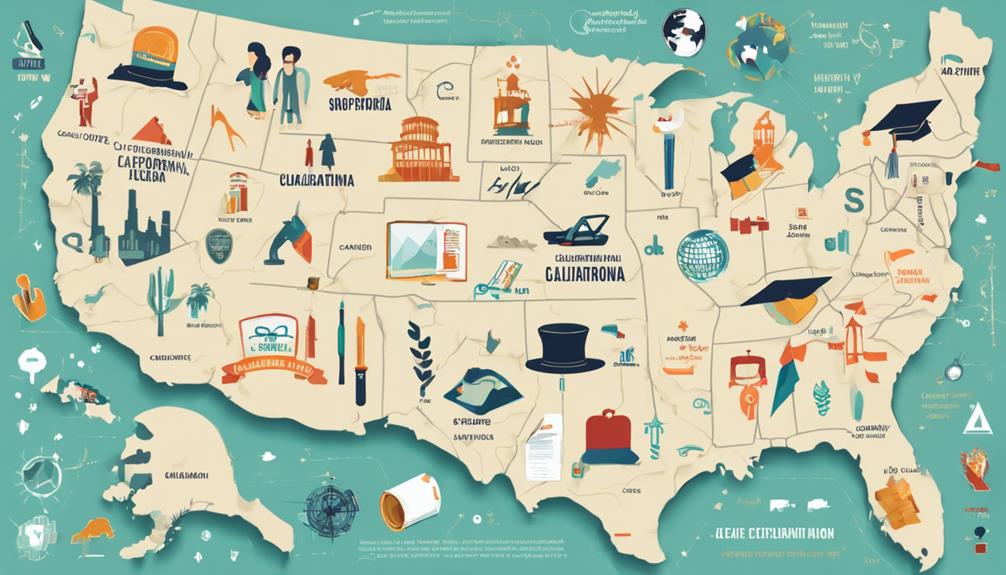
As educators aiming to enhance our understanding and practice in supporting Deaf and Hard of Hearing students, exploring the offerings of the Deaf Studies Department opens up valuable opportunities for specialized learning and growth. The Deaf Studies Department offers a 36-unit online Deaf Education program accredited by the Council on Education of the Deaf, focusing on bilingual/bicultural approaches and ASL proficiency.
Here are some key highlights of the program:
- Two enrollment options are available: DHH Student Teaching Option and DHH Intern Credential Option.
- The program includes specific CSDS courses tailored to Deaf Education.
- Completion of a teaching credential is encouraged through a partnership with the Kremen School of Education.
- Expert faculty members like Ellen Schneiderman and Rachel Friedman Narr provide support and expertise in Deaf Education, enriching the learning experience for students seeking to enhance their ASL proficiency and teaching skills.
Program Philosophy Overview

Highlighting the core principles guiding our program philosophy, we emphasize a holistic approach centered on fostering bilingual/bicultural education for Deaf and Hard of Hearing individuals. Our program is designed to cater to the unique needs of each student, offering individualized placement and programs to ensure their success. We advocate for a continuum of service options to address the diverse requirements within the Deaf and Hard of Hearing community. Communication is at the heart of our program, with a strong emphasis on American Sign Language competence for all participants. By promoting an understanding of various communication and educational approaches in the field, we strive to create a comprehensive educational experience for our students.
| Program Philosophy Highlights |
|---|
| Bilingual/Bicultural Education |
| Individualized Placement and Programs |
| Continuum of Service Options |
Our commitment to excellence in Deaf and Hard of Hearing education drives us to provide innovative and inclusive learning opportunities that empower our students to thrive.
American Sign Language Proficiency
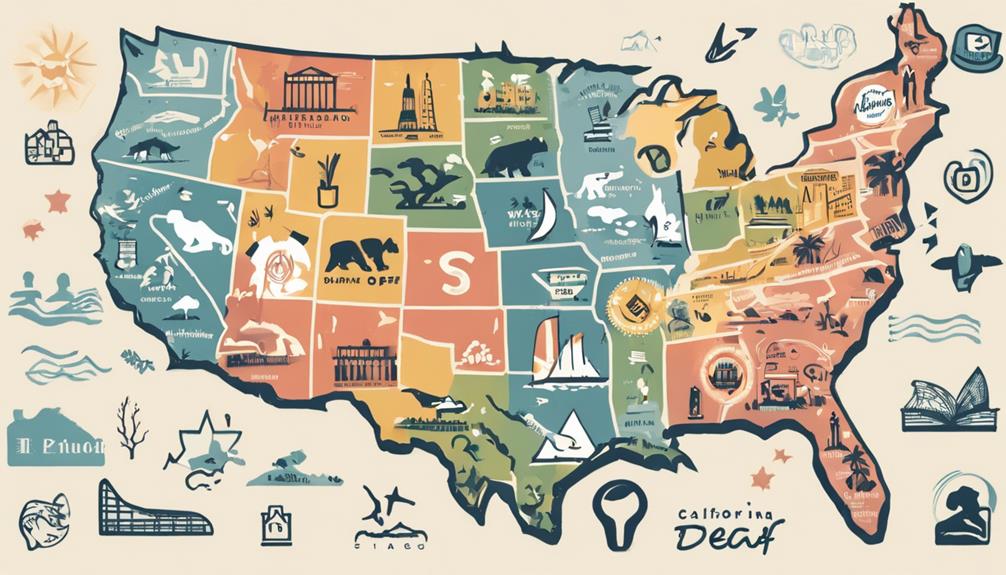
When it comes to American Sign Language Proficiency, understanding ASL Skill Assessment and Signing Proficiency Levels is crucial.
These aspects help us determine our proficiency in ASL and guide us in reaching higher levels of fluency.
Mastering these skills is essential for success in Deaf and Hard of Hearing Credential programs.
ASL Skill Assessment
Completing the ASL Skill Assessment is a crucial step for individuals pursuing the Deaf and Hard of Hearing Credential programs in California. The assessment evaluates proficiency in American Sign Language, adapted from the Language Proficiency Interview for ASL. Conducted through an interview format, it assesses knowledge and skills in ASL, helping determine language proficiency specifically in ASL.
Here are some key points to consider:
- Evaluation of ASL proficiency
- Adapted from the Language Proficiency Interview for ASL
- Conducted through an interview format
- Determines language proficiency specifically in ASL
This assessment is a vital component for those aiming to excel in the Deaf and Hard of Hearing Credential programs in California.
Signing Proficiency Levels
Assessing one's American Sign Language proficiency level is crucial for determining competency and eligibility for various programs and certifications.
The American Sign Language Proficiency Interview (ASLPI) serves as a standardized assessment tool specifically designed to evaluate signing proficiency. This evaluation method examines an individual's ability to comprehend and utilize American Sign Language effectively, focusing on linguistic aspects such as vocabulary, grammar, and fluency.
ASLPI scores range from 0 to 5, with 0 indicating a lack of signing ability and 5 reflecting a level of proficiency similar to that of a native signer. These results play a vital role in determining an individual's competency in ASL, influencing their access to specific programs or certifications related to hearing loss and signing proficiency.
Education Grant Information
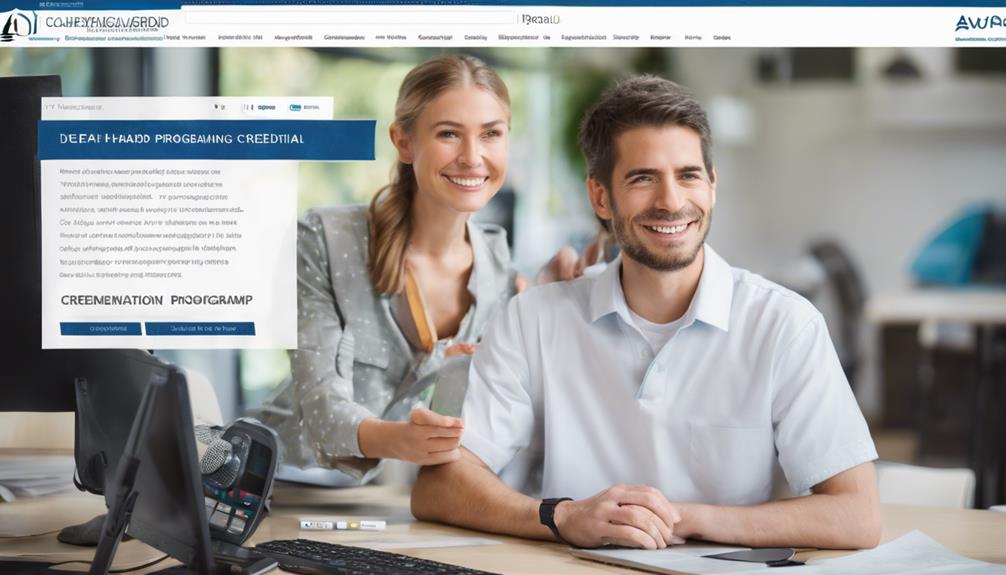
Contribute to your educational journey by exploring the Education Grant available for Deaf and Hard of Hearing credential programs in California. The Education Grant for Deaf and Hard of Hearing Credential programs in California amounts to $1.25 million over 5 years, funded by the U.S. Department of Education to support 55 graduate scholars with tuition assistance and curriculum enhancement.
Here are some key points about the grant:
- The grant aims to provide financial support for students pursuing their credentials in the field of Deaf and Hard of Hearing education.
- It assists in covering tuition costs and improving the educational experience for graduate scholars in the program.
- This grant is a significant source of financial aid for students in California seeking credentials in Deaf and Hard of Hearing education.
- It offers an opportunity for students to focus on their studies without the added financial burden, enhancing their learning experience and future opportunities in the field.
Program Requirements Details
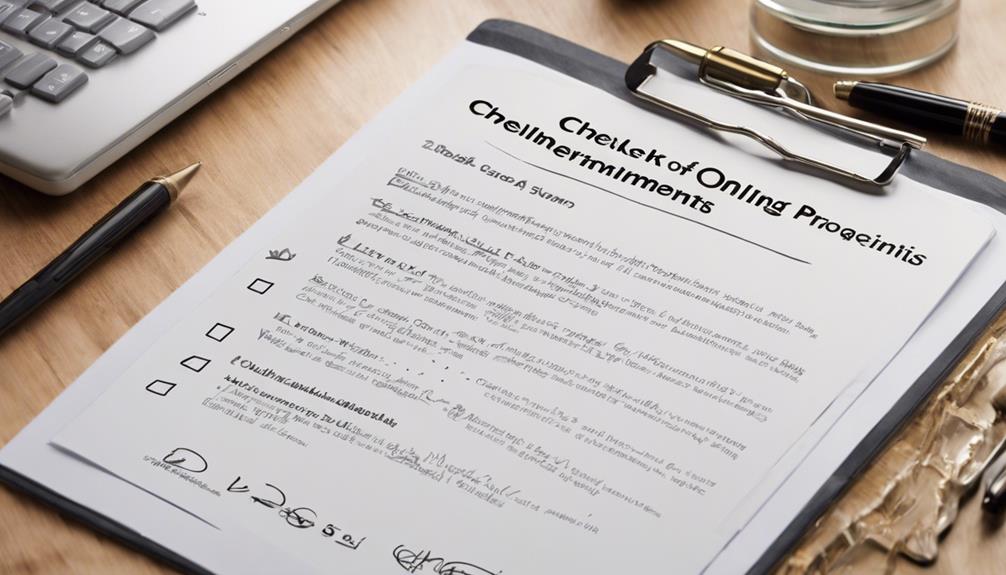
As prospective scholars, understanding the specific requirements for the Traditional and Intern Programs is crucial for navigating the path towards a teaching credential in Deaf and Hard of Hearing (DHH) education. The Traditional Program necessitates 49 units for completion, while the Intern Program requires 52 units to fulfill the credential requirements. Additionally, passage of the American Sign Language Proficiency Interview is mandatory for both programs. In the Traditional Program, there are 120 hours of preservice preparation included, offering a comprehensive foundation for aspiring educators. On the other hand, the Intern Program involves a minimum of 6 units per semester for on-the-job teachers, providing hands-on experience alongside coursework.
| Program | Required Units | ASL Proficiency | Preservice Preparation |
|---|---|---|---|
| Traditional Program | 49 units | Required | 120 hours |
| Intern Program | 52 units | Required | N/A |
Program Learning Outcomes
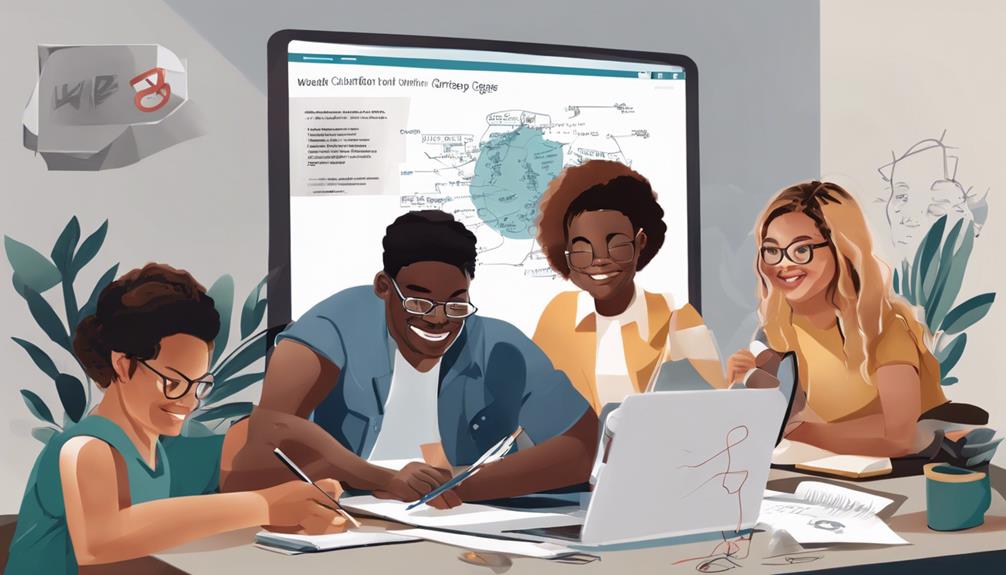
In our program, we focus on equipping students with the essential skills and knowledge needed to excel in teaching and supporting deaf and hard of hearing individuals. Our program learning outcomes include:
- Graduates demonstrate proficiency in American Sign Language and specialized instructional strategies for deaf and hard of hearing students.
- Students acquire the necessary skills to assess, plan, and implement individualized educational programs for students with hearing loss.
- Program participants develop a deep understanding of deaf culture, language development, and educational approaches for diverse learners.
- Graduates are prepared to promote inclusive practices, advocate for students, and collaborate effectively with families and educational teams.
Frequently Asked Questions
What Are the 2 Deaf Schools in California?
Sure!
There are two deaf schools in California: California School for the Deaf, Fremont (CSDF) and California School for the Deaf, Riverside (CSDR). Both schools provide educational programs for Deaf and Hard of Hearing students from preschool through high school. They focus on a bilingual approach to education, emphasizing American Sign Language (ASL) and English proficiency.
CSDF, established in 1860, is one of the oldest public schools for Deaf students in the U.S. CSDR offers a comprehensive educational experience tailored to the unique needs of Deaf and Hard of Hearing students.
What Is the Best School for the Hearing Impaired?
When looking for the best school for the hearing impaired, it's crucial to consider programs that offer comprehensive support and a focus on individualized learning.
California State University, Fresno stands out for its accredited Deaf Education program, emphasizing a bilingual/bicultural approach and communicative competence in American Sign Language.
Their faculty members provide expertise and encourage professional involvement, ensuring a well-rounded education for students.
Are There Online Teaching Credential Programs in California?
Yes, there are online teaching credential programs in California. These programs offer flexibility and convenience for aspiring educators. They provide training and virtual practicum experiences to prepare us for working with diverse student populations.
Graduates from accredited online programs meet the qualifications for obtaining teaching credentials. Pursuing an online teaching credential in California allows us to balance our education with other commitments while preparing for a rewarding career in education.
What Is the Most Popular Deaf School?
The most popular deaf school is the California School for the Deaf (CSD), with campuses in Fremont and Riverside. Known for its comprehensive programs from preschool to high school, CSD focuses on a bilingual/bicultural approach using American Sign Language (ASL) and English.
One fascinating statistic is CSD's long history of providing specialized services and experienced faculty, making it a top choice for deaf and hard of hearing education in California.
Conclusion
In conclusion, the online Deaf Education program at California State University, Fresno offers a comprehensive and accredited education for those seeking to work with Deaf and Hard of Hearing students.
One example of success is Sarah, who graduated from the program and now works as a Deaf Education teacher, making a positive impact in the lives of her students every day.
With a focus on bilingual/bicultural education and individualized support, this program prepares educators to make a difference in the lives of Deaf and Hard of Hearing individuals.
Jamie is one of the creative forces behind the words that resonate with our audience at Deaf Vibes. With a passion for storytelling and advocacy, Jamie delves into topics that matter deeply to the deaf and hard-of-hearing community. Jamie’s articles are crafted with empathy, insight, and a commitment to positive change, from exploring the latest advancements in hearing technologies to shedding light on the everyday challenges and victories of those within the community. Jamie believes in the power of shared stories to inspire action, foster understanding, and create a more inclusive world for everyone.
Living with Hearing Loss
7 Best Deaf Dating Apps for a Dumbfounding Experience
Step into the fascinating world of Deaf dating apps where connections are redefined and relationships blossom in unique ways.
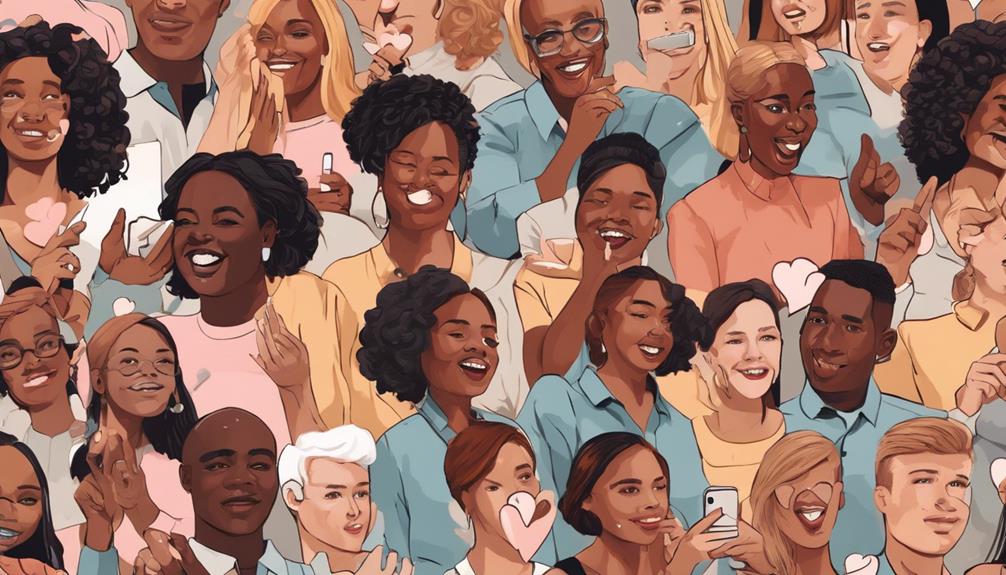
Have you ever wondered how technology is revolutionizing the way Deaf individuals connect and build relationships?
The world of Deaf dating apps offers a plethora of options tailored to the unique needs of the community, each with its own features and strengths.
From specialized platforms like Signing Love to inclusive apps like DeafConnections, the landscape is diverse and intriguing.
Discover how these apps are reshaping the dating experience for Deaf individuals, providing avenues for meaningful connections and companionship like never before.
Key Takeaways
- Deaf dating apps prioritize genuine connections over superficial interactions.
- These platforms offer safe and inclusive spaces for the Deaf community.
- Communication tools cater to unique needs, fostering strong relationships.
- Deaf dating apps celebrate Deaf culture, enhancing mutual understanding and respect.
Signing Love: A Deaf-Friendly Platform
Immerse yourself in the world of deaf-friendly online dating with Signing Love, a platform tailored for Deaf, hard of hearing, and ASL users. When it comes to Deaf dating, this app stands out for its commitment to creating a safe and inclusive space where deaf singles can connect authentically. Signing Love goes beyond just matching profiles; it fosters meaningful relationships through features like video profiles and chat, enhancing your online dating experience.
Privacy and security are paramount on Signing Love, ensuring that you feel comfortable and secure as you navigate the exciting world of online dating within the deaf community. With a growing user base, this platform has become a top choice for those seeking love and companionship. Whether you're looking for friendship, romance, or something more, Signing Love provides a supportive environment where you can explore connections with like-minded individuals who understand and appreciate the unique aspects of Deaf culture.
DeafConnections: Where Hearts Meet
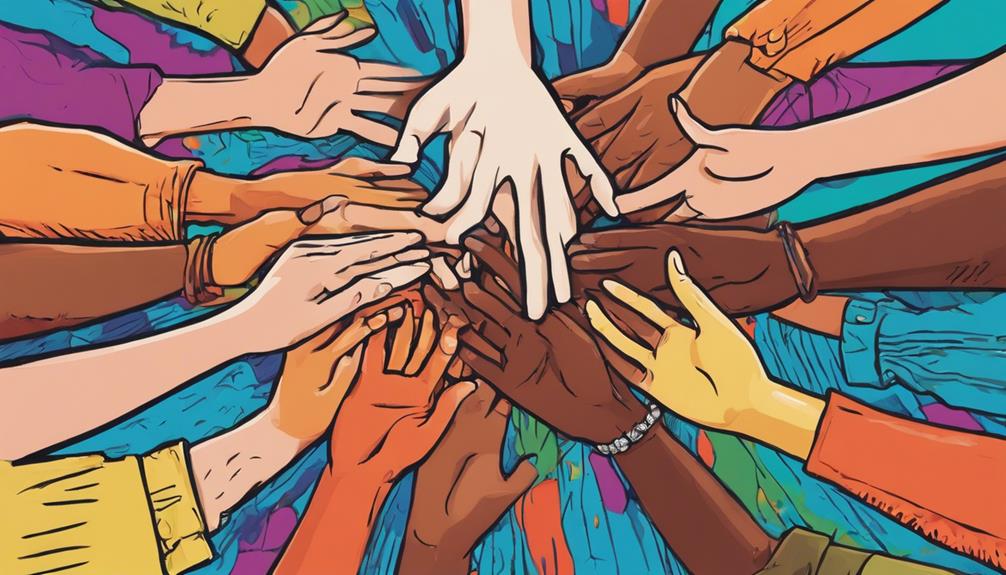
If you're seeking a dating app that understands the importance of unique matching algorithms, interactive Sign Language features, and community events integration, DeafConnections might just be the perfect fit for you.
This platform goes beyond standard dating apps by catering specifically to the Deaf community, providing a space where hearts can truly meet.
With its emphasis on fostering genuine connections and understanding, DeafConnections offers a welcoming environment for Deaf, hard of hearing, and ASL users alike.
Unique Matching Algorithms
DeafConnections utilizes unique matching algorithms to facilitate connections among Deaf, hard of hearing, and ASL singles based on compatibility factors such as communication preferences, interests, and values.
Here's how it works:
- Personalized Compatibility: DeafConnections considers individual communication styles, hobbies, and core beliefs to create meaningful matches.
- Detailed Profiles: Users can showcase their personality, lifestyle, and relationship preferences to attract like-minded partners.
- Seamless Communication: The app offers features like real-time messaging and video calls for effortless interaction, fostering genuine connections within the Deaf community.
Interactive Sign Language
How can you enhance your sign language skills and connect more effectively within the Deaf community through interactive features on the app DeafConnections: Where Hearts Meet?
DeafConnections offers a unique platform where you can practice and improve your sign language skills through interactive video chats. By engaging in these interactive sign language features, you not only enhance your communication abilities but also form deeper connections with others who share your language and culture.
This app fosters a supportive community where Deaf, hard of hearing, and ASL users can come together to learn, socialize, and build meaningful relationships. Break down communication barriers, immerse yourself in a rich signing environment, and experience the joy of connecting with others on a deeper level through DeafConnections.
Community Events Integration
Immerse yourself in a vibrant community of Deaf individuals by seamlessly integrating local events into your dating experience on DeafConnections: Where Hearts Meet.
Here's how this integration enhances your dating journey:
- Belonging and Connection: Feel a sense of belonging and connection as DeafConnections integrates community events directly into the app.
- Real-Life Interactions: Discover and participate in local Deaf community events like social gatherings and workshops, fostering real-life interactions beyond the virtual realm.
- Meaningful Relationships: Meet and engage with other deaf singles in person, creating opportunities for deeper connections and meaningful relationships.
Sparked: Ignite Deaf Romances
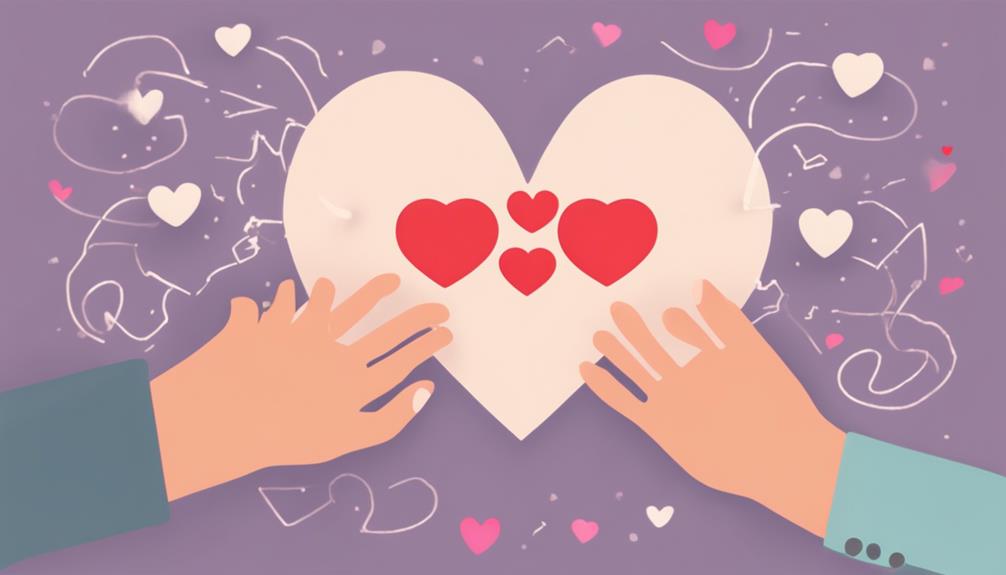
Looking to enhance your communication strategies as a Deaf couple? Navigating Deaf culture together can be a rewarding journey.
Let's explore how Sparked can help ignite and foster strong romances in the Deaf community.
Communication Strategies for Deaf Couples
Exploring effective communication strategies is key to nurturing a strong and connected relationship for Deaf couples. When communicating with your partner, consider the following:
- Utilize sign language, gestures, facial expressions, and body language to convey emotions and thoughts effectively.
- Develop unique communication methods based on individual preferences and needs to foster a deeper understanding and connection in your relationship.
- Embrace technology like video calls, texting, and video relay services to enhance your ability to stay connected and communicate seamlessly.
Navigating Deaf Culture Together
To deepen your connection as a Deaf couple, understanding and embracing the intricacies of Deaf culture together can enrich your romantic journey on platforms like Deaf dating apps.
By navigating Deaf culture hand in hand, you can bond over shared experiences, values, and language. These apps create a safe space where you can explore your identities and celebrate what makes your relationship unique.
Embracing Deaf culture together fosters a deeper connection and mutual respect, laying a strong foundation for your romance. Whether it's sharing stories about growing up Deaf or discussing the importance of sign language, exploring these aspects of your shared culture can strengthen your bond and create a meaningful, lasting relationship on these platforms.
Silent Hearts: Finding Love in Quiet

In the realm of Deaf dating, Silent Hearts stands out as a beacon of hope for those seeking love in the quiet embrace of shared understanding and connection. This app caters specifically to the Deaf community, providing a platform where individuals can express their communication preferences and interests openly. Here's why Silent Hearts resonates with many seeking love:
- Tailored Profiles: Users have the opportunity to create detailed profiles, allowing them to showcase their personalities, interests, and what they're looking for in a partner. This feature enhances the chances of finding a compatible match based on shared values and interests.
- Communication Features: Silent Hearts offers a variety of communication tools such as real-time chat, video calls, and voice messages. These features facilitate easy and meaningful interactions, bridging the gap of communication barriers within the Deaf community.
- Safe Space for Connections: By focusing on fostering meaningful relationships, Silent Hearts provides a safe and inclusive environment for Deaf individuals to explore love and companionship without judgment or misunderstanding. This emphasis on creating a supportive community enhances the overall dating experience for its users.
Handwave: Waving Hello to Love
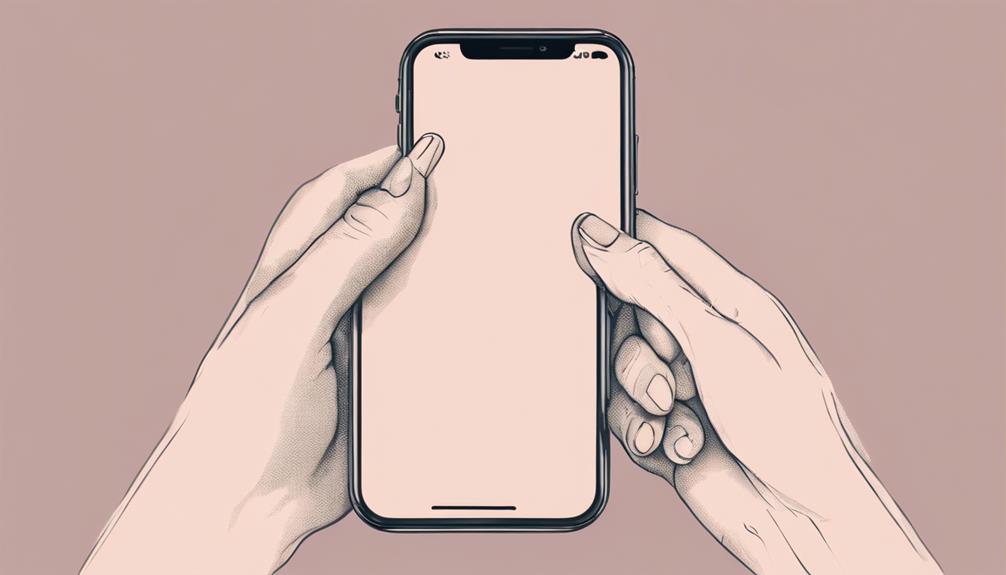
Handwave, a deaf dating app, welcomes you to a vibrant community where love and connection are just a wave away. Designed for the Deaf community, Handwave offers a user-friendly interface and real-time chat features, making communication easy and accessible. Whether you're Deaf, hard of hearing, or an ASL user, this app provides a platform for finding meaningful relationships and friendships. By creating detailed profiles that highlight your interests, personality, and desires in a partner, Handwave allows you to showcase your authentic self and connect with like-minded individuals.
Within Handwave, you'll discover a safe and inclusive space where Deaf individuals can explore dating options without barriers. The app prioritizes creating a supportive environment where you can feel comfortable expressing your true self and engaging with others who share your values and interests. With Handwave, the journey to finding love isn't only exciting but also filled with the potential for genuine connections that can last a lifetime.
DeafDaters: Matching Silent Souls
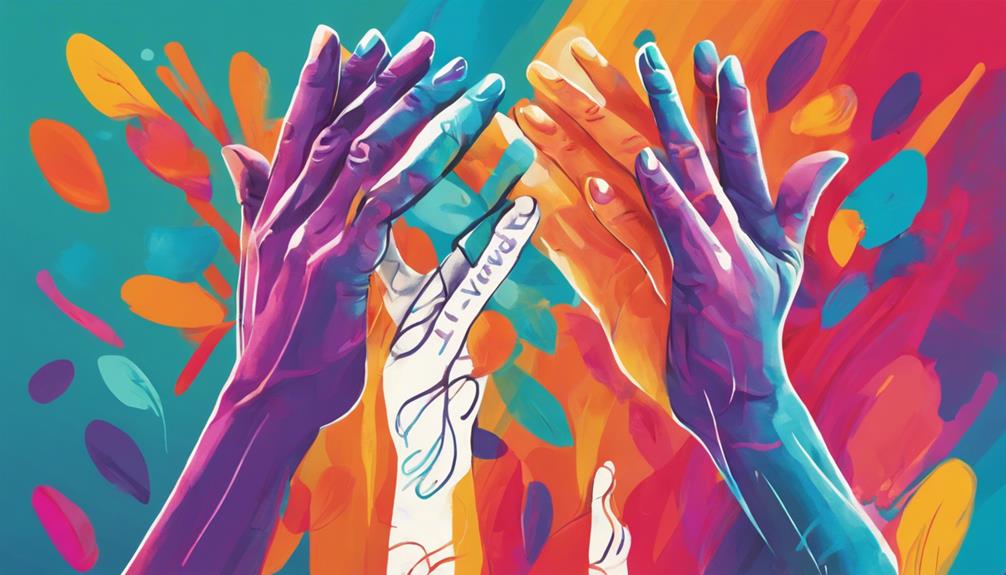
Navigating the world of deaf dating can be a transformative experience with DeafDaters, a platform that specializes in matching silent souls. If you're looking to connect with like-minded individuals within the Deaf community, DeafDaters offers a welcoming space for building meaningful relationships. Here's why DeafDaters stands out:
- Tailored for the Deaf Community: DeafDaters is specifically designed to cater to the unique needs and preferences of Deaf individuals, ensuring a comfortable and understanding environment for all users.
- Detailed Profiles: The app allows users to create detailed profiles showcasing their personalities, interests, and what they're looking for in a partner, fostering genuine connections based on shared values and beliefs.
- Inclusive and Safe: With an emphasis on inclusivity and safety, DeafDaters provides a secure platform where Deaf individuals can interact, socialize, and potentially find friendship or romance without barriers.
LoveSigns: Communicate in Affection
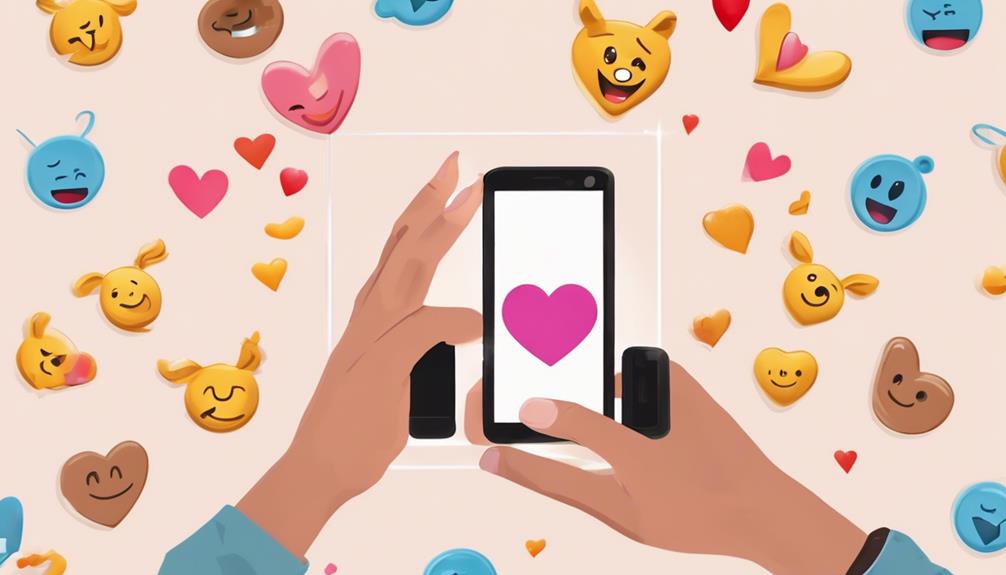
When seeking a platform that embraces the beauty of sign language in fostering connections among the Deaf community, LoveSigns stands out as a beacon of communication and affection. LoveSigns is a deaf dating app designed to facilitate communication through sign language, catering to deaf, hard of hearing, and ASL singles seeking meaningful relationships. The app offers features like video chat and messaging to enhance the dating experience, focusing on creating a supportive and understanding community for deaf individuals looking for love. LoveSigns provides a comfortable platform where deaf singles can express themselves authentically and form genuine connections. Below is a table highlighting key features of LoveSigns:
| Feature | Description |
|---|---|
| Communication through Sign Language | Embraces the beauty of sign language for meaningful connections |
| Video Chat | Enhances interaction by allowing users to communicate visually |
| Messaging | Facilitates ongoing conversations between users for deeper connections |
| Supportive Community | Creates an understanding environment for deaf individuals seeking love |
Frequently Asked Questions
Are There Dating Apps for Deaf People?
Yes, there are dating apps tailored for deaf individuals. These platforms offer features like video calls and chat to foster connections. You can create a profile highlighting your interests and communication preferences, making it easier to find meaningful relationships.
How Do I Find a Deaf Person to Date?
To find a Deaf person to date, immerse yourself in Deaf culture by joining ASL clubs and events. Sign up on specialized dating sites like Deafs.com or try Deaf dating apps such as Deaf Dating Zone to connect with potential partners.
How to Meet Deaf Girls?
To meet Deaf girls, attend Deaf events, learn sign language, and show respect for their culture. Be patient, open-minded, and genuinely interested in building connections. Using communication apps can also help you interact comfortably.
Is Dating a Deaf Person Hard?
Dating a deaf person may present unique challenges, but with understanding and effort, it can be a rewarding experience. Communication barriers can be overcome with patience and empathy, making the relationship fulfilling and enriching.
Conclusion
As you explore the world of Deaf dating apps, let the sparks of connection and love ignite within you. Embrace the silent whispers of affection and the gestures of understanding that these platforms offer.
Find your hand to hold, your heart to connect with, and your soulmate to communicate in the language of love. Let the silent beats of your heart resonate with the symphony of affection on these Deaf-friendly platforms.
Love knows no bounds, especially in the realm of silence.
Jamie is one of the creative forces behind the words that resonate with our audience at Deaf Vibes. With a passion for storytelling and advocacy, Jamie delves into topics that matter deeply to the deaf and hard-of-hearing community. Jamie’s articles are crafted with empathy, insight, and a commitment to positive change, from exploring the latest advancements in hearing technologies to shedding light on the everyday challenges and victories of those within the community. Jamie believes in the power of shared stories to inspire action, foster understanding, and create a more inclusive world for everyone.
Living with Hearing Loss
Top Deaf-Friendly Vacation Destinations
Journey through top deaf-friendly vacation destinations, starting with a surprising gem that will captivate your senses and spark your wanderlust.

When it comes to the best vacation spots for deaf individuals, the possibilities are truly limitless.
From the vibrant deaf community in Spain to the modern accessibility in the United Arab Emirates, each location offers a unique experience catered to deaf travelers.
Whether you're seeking cultural immersion, scenic beauty, or historical exploration, these destinations have something special in store for you.
So why not explore the world and discover the perfect deaf-friendly getaway waiting for you to uncover its hidden gems?
Key Takeaways
- Europe offers deaf-friendly hotels and ASL-guided tours.
- Asia and Oceania provide sign language interpretation and accessible tours.
- Worldwide accommodations include unique amenities and sign language services.
- Americas feature accessible cultural experiences and engaging sign language tours.
Spain's Vibrant Deaf Community
Spain's vibrant deaf community warmly embraces deaf travelers with accessible resources and accommodations, making it a top destination for an inclusive vacation experience. Deaf-friendly hotels and services abound in popular Spanish cities like Madrid and Barcelona, ensuring a comfortable stay for visitors. These accommodations cater specifically to the needs of deaf travelers, offering features like visual alarm systems, vibrating wake-up devices, and TTY devices for communication. Moreover, Spain stands out for its ASL-guided tours, providing a unique opportunity for deaf visitors to explore the rich culture and history of the country with ease.
The Deaf community in Spain plays a vital role in enhancing the travel experience for deaf individuals. Guides and interpreters aren't only fluent in ASL but also possess a deep understanding of deaf culture, ensuring seamless communication and meaningful interactions. This level of cultural competence contributes to a welcoming atmosphere where deaf travelers can fully immerse themselves in the local customs and traditions. Whether enjoying a flamenco show in Seville or marveling at the architectural wonders of Antoni Gaudí in Barcelona, deaf visitors can partake in a range of activities that celebrate Spain's vibrant heritage.
Switzerland's Scenic Beauty for Deaf Travelers

Embracing the breathtaking landscapes and accessibility of Switzerland, deaf travelers can immerse themselves in the scenic beauty of the Swiss Alps and crystal-clear lakes, offering a perfect backdrop for unforgettable experiences.
Reasons Why Switzerland is Ideal for Deaf Travelers:
- Swiss Alps: The majestic Swiss Alps provide a stunning setting for outdoor adventures like hiking, offering deaf travelers a chance to connect with nature and enjoy the panoramic views.
- Charming Swiss Towns: Explore picturesque towns like Interlaken, Zermatt, and Lucerne, known for their deaf-friendly atmosphere and welcoming locals, creating a cozy and inclusive environment.
- Outdoor Activities: From skiing in the winter to paragliding in the summer, Switzerland offers a plethora of outdoor activities suitable for deaf tourists, ensuring an active and engaging vacation.
- Inclusive Accommodations: Swiss cities such as Zurich and Geneva boast deaf-friendly accommodations, tours, and attractions, making it convenient for deaf travelers to fully experience the beauty and culture of Switzerland.
Switzerland's blend of natural wonders, charming towns, and diverse activities make it a top choice for deaf travelers seeking an enriching vacation experience.
Sweden's Accessibility and Culture
Highlighting Sweden's commitment to accessibility and inclusion, the country offers a welcoming environment for deaf travelers to immerse themselves in its rich culture and explore with ease. Sweden stands out for its deaf-friendly culture, providing a range of services tailored to meet the needs of travelers with hearing impairments.
Deaf visitors can enjoy guided trips and tours with fluent ASL interpreters and culturally sensitive guides, ensuring a seamless and enriching experience. Accessibility features, such as sign language resources, deaf-friendly accommodations, and communication support, contribute to making Sweden a top destination for deaf travelers.
Popular tourist attractions in Sweden also prioritize inclusivity, further enhancing the overall experience for deaf visitors. The tourism industry in Sweden is dedicated to ensuring that all travelers, including those who are deaf, feel welcome and have the opportunity to fully enjoy everything this beautiful country has to offer.
Japan's Deaf-Friendly Attractions

With an array of deaf-friendly attractions catering to the needs of hearing-impaired visitors, Japan welcomes travelers to immerse themselves in a culturally rich and inclusive experience. When exploring Japan, deaf visitors can enjoy the following attractions:
- National Museum of Ethnology: Located in Osaka, this museum offers sign language guides and captioned exhibits, ensuring a fully immersive experience for deaf travelers.
- Tokyo Disneyland: Providing visual aids and sign language interpretation, this iconic theme park ensures that deaf visitors can delight in the magical atmosphere.
- Historic Temples in Kyoto: Deaf travelers can explore the rich history of Kyoto with accessible tours and information presented in sign language, making the experience informative and engaging.
- Bullet Trains: Japan's efficient transportation system includes bullet trains with visual announcements and assistance for deaf passengers, allowing easy navigation and seamless travel experiences.
Australia's Adventure for Deaf Visitors
Australia's adventure offerings for deaf visitors encompass barrier-free Outback tours, sign language excursions, and deaf-friendly accommodations.
These experiences not only provide thrilling activities like snorkeling in the Great Barrier Reef but also ensure inclusivity through guided tours with sign language interpreters.
National parks such as Kakadu and Uluru offer accessible trails and lodging, while cities like Sydney and Melbourne boast deaf-friendly attractions like museums and theaters.
Barrier-Free Outback Tours
Immerse yourself in the captivating wonders of the Australian Outback with Barrier-Free Outback Tours tailored specifically for deaf visitors. These tours in Australia offer a seamless and immersive adventure, ensuring deaf travelers can explore the stunning Outback with ease. Here's why these tours are a must-experience:
- Specialized sign language guides cater to deaf visitors.
- Tailored tours and accommodations meet the unique needs of deaf travelers.
- Unique opportunity to experience the natural beauty and culture of the Outback.
- Inclusive experiences with deaf-friendly communication methods and accessibility features await.
Embark on a journey where accessibility meets adventure, creating unforgettable moments in the heart of Australia's Outback.
Sign Language Excursions
Embarking on these sign language excursions in Australia's Adventure for Deaf Visitors opens up a world of iconic landmarks and inclusive travel experiences tailored specifically for deaf participants. Led by guides fluent in sign language, these tours ensure seamless communication for deaf travelers exploring popular destinations.
Throughout the excursions, participants can engage in conversations, share experiences, and learn about Australian culture all in sign language. Deaf-friendly accommodations and activities are seamlessly integrated, ensuring a comfortable and accessible journey.
From witnessing the beauty of the Great Barrier Reef to marveling at the Sydney Opera House, every moment is enriched with sign language interactions, creating a truly immersive and unforgettable experience for deaf visitors seeking innovative and inclusive travel opportunities.
Deaf-Friendly Accommodations
Our journey to discover deaf-friendly accommodations in Australia's Adventure for Deaf Visitors unveils a range of tailored lodging options designed to ensure a seamless and enjoyable stay for individuals with hearing impairments. When exploring Australia, deaf travelers can expect accommodations that cater specifically to their needs. Here are some key features of deaf-friendly accommodations in Australia:
- Accessible Room Features: Australian hotels and resorts offer rooms equipped with visual alert systems and other accessibility features.
- Sign Language Services: Many accommodations provide staff fluent in sign language to assist deaf guests effectively.
- Inclusive Activities: Adventure tours and activities in Australia are inclusive, ensuring deaf visitors can fully participate.
- Comfort and Enjoyment: Deaf-friendly accommodations prioritize the comfort and enjoyment of individuals with hearing loss throughout their stay.
South Africa's Inclusive Safari Experience

When planning a safari adventure in South Africa, deaf travelers can expect a truly inclusive experience tailored to their communication needs. South Africa offers a unique safari experience with deaf-friendly accommodations and sign language interpreters. Tour operators in this diverse country prioritize inclusivity by providing guides fluent in various sign languages, ensuring that all visitors can fully engage with the rich wildlife and landscapes.
Deaf-friendly accommodations in South Africa cater to the needs of hearing-impaired visitors, offering a comfortable and accessible stay during their safari adventure. Specialized safari tours focus on enhancing the sensory experiences of deaf tourists, incorporating visual and tactile interactions with nature. This inclusive safari experience not only promotes accessibility but also embraces diversity, providing memorable encounters with African wildlife. South Africa's commitment to inclusivity in safari tourism sets a high standard for accessible travel, making it an ideal destination for deaf travelers seeking innovative and enriching experiences in the heart of the wild.
Canada's Deaf-Friendly Cities

When considering Canada's deaf-friendly cities, it's crucial to highlight the sign language accessibility, deaf community events, and communication services available.
Toronto in Ontario stands out with attractions like the Royal Ontario Museum catering to the deaf community's needs.
Vancouver in British Columbia also excels in offering sign language interpreters and hosting deaf cultural events, making it a welcoming destination for deaf travelers.
Sign Language Accessibility
In Canadian cities such as Toronto, Vancouver, and Montreal, sign language accessibility is a fundamental aspect of public spaces, transportation, and cultural venues. When exploring these vibrant destinations, deaf individuals can expect a welcoming environment that caters to their communication needs. Here's how Canadian cities prioritize sign language accessibility:
- Sign language interpreters available in hospitals, government offices, and educational institutions.
- Deaf-friendly businesses in Canada prioritize communication through sign language.
- Universities and colleges offer sign language courses and resources for enhanced communication.
- Public events and festivals often include sign language interpreters for the deaf community's participation and enjoyment.
These initiatives showcase a commitment to inclusivity and ensure a fulfilling experience for all visitors.
Deaf Community Events
As we explore the vibrant deaf-friendly cities in Canada like Toronto, Vancouver, and Montreal, a rich tapestry of community events awaits the deaf population, fostering connection and engagement in a welcoming environment. These cities host a variety of deaf community events, from cultural festivals to workshops, all with sign language interpretation services to ensure inclusivity. The inclusive environment in Toronto, Vancouver, and Montreal creates a space where the deaf community can thrive and feel connected. Whether it's an art exhibit, a social gathering, or a sporting event, deaf individuals in these cities have ample opportunities to participate and engage. The commitment to accessibility in these cities truly makes them top destinations for enriching community experiences.
| Deaf Community Events | Sign Language Interpretation | Inclusive Environment |
|---|---|---|
| Cultural Festivals | Available | Welcoming |
| Workshops | Provided | Accessible |
| Social Gatherings | Offered | Inclusive |
Communication Services Available
Accessible communication services are a cornerstone of the deaf-friendly cities in Canada like Toronto, Vancouver, and Montreal, ensuring seamless interactions for deaf travelers.
- Sign language interpretation, closed captioning, and text messaging services are readily available in public spaces in these cities.
- Deaf individuals can easily navigate transportation systems, hotels, and tourist attractions with the support of communication services.
- Tourist information centers in deaf-friendly cities provide resources in multiple formats to accommodate various communication preferences.
- Canada's commitment to accessibility ensures that deaf travelers can enjoy a seamless and inclusive vacation experience in these cities.
New Zealand's Nature for Deaf Explorers

Nestled within New Zealand's breathtaking landscapes are opportunities for deaf explorers to engage in enriching outdoor adventures and wildlife encounters. The country's diverse environment offers a perfect setting for nature enthusiasts to immerse themselves in the beauty of its national parks, mountains, lakes, and coastlines. Deaf travelers can enjoy activities like hiking on accessible trails, scenic drives, and inclusive outdoor adventures tailored to cater to individuals with hearing impairments. Guided tours provide a fantastic way to explore New Zealand's stunning nature while ensuring an inclusive and informative experience for deaf visitors.
| Activities | Description |
|---|---|
| Hiking | Accessible trails for stunning hikes. |
| Sightseeing | Visually captivating national parks. |
| Wildlife Encounters | Diverse wildlife experiences. |
Costa Rica's Eco-Tourism for Deaf Tourists

Exploring Costa Rica's eco-tourism offerings provides deaf tourists with immersive experiences in sustainable practices and diverse ecosystems, enhancing their connection to nature. Costa Rica's commitment to eco-tourism aligns with the values of deaf travelers seeking to engage with the environment responsibly. Here are some reasons why Costa Rica stands out as a top destination for eco-conscious deaf tourists:
- Sustainability Focus: Costa Rica's eco-tourism opportunities prioritize sustainability and nature conservation, allowing deaf visitors to appreciate the beauty of the natural world while supporting environmentally friendly practices.
- Guided Tours: Deaf tourists can enjoy guided tours in Costa Rica's lush rainforests and diverse ecosystems, learning about the flora and fauna through visually engaging experiences.
- Eco-Friendly Accommodations: Costa Rica offers eco-friendly accommodations that cater to the specific needs of deaf travelers, ensuring a comfortable and inclusive stay.
- Sign Language Interpreters: Sign language interpreters are available to accompany deaf tourists, enhancing their understanding and enjoyment of Costa Rica's vibrant wildlife and stunning landscapes through clear communication.
Iceland's Natural Wonders for Deaf Adventurers

Costa Rica's eco-tourism offerings have paved the way for deaf travelers to now immerse themselves in Iceland's breathtaking natural wonders tailored for adventurous exploration. Iceland's landscape boasts stunning features like majestic waterfalls, powerful geysers, and vast glaciers that provide a playground for deaf adventurers seeking thrilling experiences.
One of the unique delights Iceland offers is the opportunity to witness the mesmerizing Northern Lights dancing across the dark winter skies, a sight that transcends language barriers and speaks directly to the soul.
Accessibility features in Iceland cater to deaf visitors, with services such as sign language interpreters and deaf-friendly guides making it easier to navigate and appreciate the country's beauty. The Blue Lagoon, a geothermal spa surrounded by volcanic landscapes, offers a serene and rejuvenating experience for deaf tourists looking to unwind amidst Iceland's natural wonders.
From black sand beaches to volcanic terrains, Iceland's diverse scenery promises a visually captivating journey for deaf vacationers seeking an immersive adventure in the midst of nature's grandeur.
Brazil's Deaf-Friendly Cultural Experiences
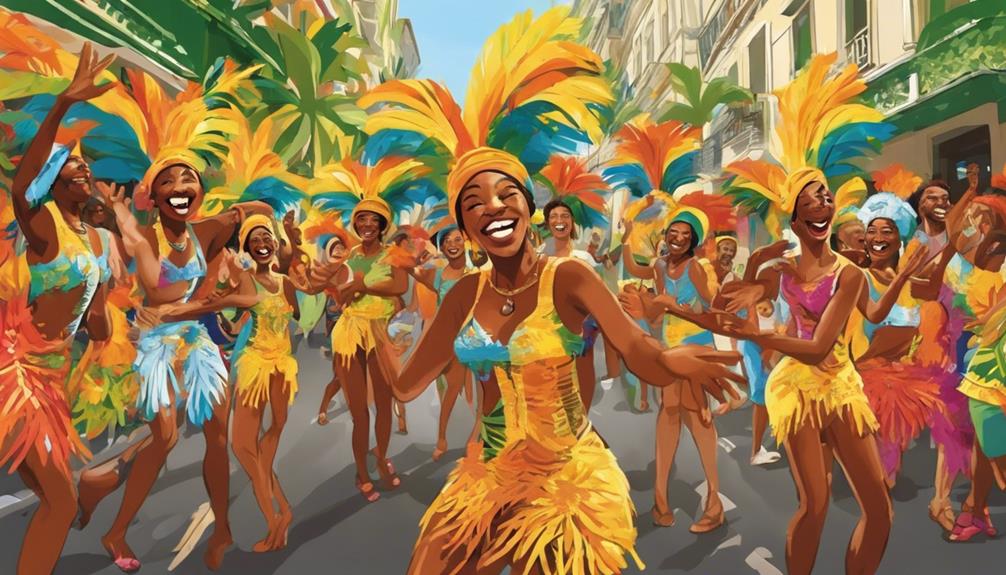
When exploring Brazil's deaf-friendly cultural experiences, we can look forward to the vibrant Rio Carnival accessibility, engaging sign language tours, and enlightening deaf community workshops.
These experiences not only immerse us in the colorful traditions of Brazil but also provide a deeper connection to the local culture.
From dancing to samba beats to embracing the beauty of the Amazon rainforest, Brazil offers a truly enriching journey for deaf travelers.
Rio Carnival Accessibility
Immersing yourself in the vibrant rhythms and colorful displays of Rio Carnival in Brazil offers a truly inclusive experience for the deaf community, with sign language interpreters and accessibility features enhancing every aspect of this cultural extravaganza. Here are some ways Rio Carnival ensures accessibility for deaf participants:
- Sign language interpreters are available at various events.
- Deaf visitors can enjoy vibrant samba performances and colorful parades.
- Accessibility features like visual cues and captioned videos enhance the experience.
- Specialized tours and services cater to deaf travelers, providing a seamless and inclusive experience.
Brazil's commitment to inclusivity at Rio Carnival showcases a welcoming environment for individuals with hearing impairments, making it a top destination for culturally immersive experiences.
Sign Language Tours
To fully embrace Brazil's vibrant culture and landmarks, deaf travelers can participate in guided sign language tours led by locals fluent in Brazilian Sign Language (Libras). These tours offer an immersive experience, allowing visitors to explore iconic landmarks, museums, and cultural events in cities like Rio de Janeiro and São Paulo.
Deaf-friendly cultural experiences are enriched with interactive activities and tailored communication, ensuring an inclusive and engaging journey for all participants. Brazil's diverse attractions and warm hospitality make it an exciting destination for sign language tours, where travelers can connect with the local culture on a deeper level.
Joining these tours not only provides access to key destinations but also fosters a sense of community and understanding among deaf travelers.
Deaf Community Workshops
Exploring beyond sign language tours, Brazil's culturally immersive workshops cater to the deaf community, providing enriching experiences focused on local culture and traditions.
In these workshops, participants can engage in hands-on activities, visual storytelling, interactive sessions, and learn about Brazilian history, arts, music, and cuisine in a deaf-friendly environment.
These workshops not only offer a deep dive into Brazilian culture but also promote inclusivity, communication, and connection within the deaf community.
Thailand's Deaf-Friendly Hospitality

In Thailand, deaf-friendly hospitality thrives with a variety of hotels and resorts offering unique amenities and services catered specifically for deaf tourists. Visitors can enjoy Tactile Signing with Deaf Hosts, providing a one-of-a-kind experience.
Guided tours to popular attractions like the Grand Palace in Bangkok and the ancient ruins of Ayutthaya are enhanced with sign language interpreters, ensuring seamless communication. Thai Sign Language's widespread usage in Thailand further facilitates interactions, enriching the travel experience for deaf visitors.
Organizations like the Thai Deaf Association play a crucial role in providing resources and support, creating a welcoming and inclusive environment. Thailand's vibrant culture, delicious cuisine, and breathtaking natural landscapes offer a fantastic backdrop for deaf-friendly vacations, allowing for a deep cultural immersion.
With these tailored services and a commitment to accessibility, Thailand stands out as a top choice for deaf travelers seeking a fulfilling and enriching holiday experience.
United Arab Emirates' Modern Accessibility

United Arab Emirates' dedication to modern accessibility shines through with a range of tailored services and amenities for deaf travelers, making it a sought-after destination for inclusive and enriching vacations. When visiting the UAE, deaf travelers can expect the following:
- Sign Language Interpreters: The UAE has embraced the use of sign language interpreters in many public places, ensuring effective communication for deaf visitors.
- Accessible Accommodations: Hotels and tourist attractions in the UAE go the extra mile to provide services that cater to the specific needs of deaf guests, enhancing their overall experience.
- Deaf-Friendly Tours: Popular destinations like Dubai and Abu Dhabi offer specialized tours and excursions designed to accommodate deaf travelers, providing unique insights into the local culture and attractions.
- Communication Aids: Beyond sign language interpreters, the UAE also offers various communication aids to facilitate seamless interactions for deaf individuals, reflecting their commitment to inclusivity and accessibility.
Greece's Historical Sites for Deaf History Buffs

Immerse yourself in Greece's historical sites, tailored for deaf history buffs seeking a rich exploration of ancient civilizations. Greece offers an array of captivating historical sites such as the iconic Acropolis and mystical Delphi, providing an ideal setting for deaf travelers to delve into the depths of Greek history and mythology. What sets Greece apart is its commitment to inclusivity, with sign language interpreters readily available at many museums and archaeological sites, ensuring that deaf visitors can fully appreciate the historical significance of each location.
For a truly enriching experience, guided tours in Greece cater specifically to deaf travelers, offering in-depth explanations and captivating stories that bring the ancient ruins to life. Below is a table highlighting some of the key historical sites in Greece that are a must-visit for deaf history buffs:
| Historical Sites | Description | Accessibility |
|---|---|---|
| Acropolis | Iconic citadel in Athens with ancient ruins like the Parthenon, offering breathtaking views of the city | Sign language interpreters available |
| Delphi | Ancient sanctuary dedicated to the god Apollo, known for its oracle, theater, and Temple of Apollo | Guided tours tailored for deaf visitors |
| Olympia | Birthplace of the Olympic Games, featuring ancient athletic facilities and the Temple of Zeus | Interactive exhibits and visual aids |
| Mycenae | Archaeological site with impressive royal tombs, including the famous Tomb of Agamemnon | Deaf-friendly tour guides |
| Knossos | Minoan palace complex on Crete, showcasing intricate architecture and ancient frescoes | Multimedia displays with subtitles |
Frequently Asked Questions
What Country Is the Most Deaf Friendly?
We believe that Sweden is the most deaf-friendly country. It offers accessible accommodations and services for deaf travelers, ensuring a smooth and enjoyable vacation experience. Sweden's commitment to inclusivity makes it stand out as a top destination for the deaf community.
From ASL-guided tours to specialized cruises, Sweden provides unique and inclusive travel opportunities that cater to the needs and preferences of deaf travelers.
What States Are Best for Deaf People?
When considering the best states for deaf individuals, it's crucial to prioritize accessibility and services tailored to their needs.
States like Florida and New York stand out for their efforts in providing inclusive experiences for the deaf community.
These destinations offer specialized services, such as sign language-trained staff and visual cues in attractions, making them ideal for enhancing vacation experiences for individuals with hearing impairments.
Which Cities Represent the Best Deaf Communities?
When it comes to cities with vibrant deaf communities, there are several standout destinations that embrace and support the needs of the deaf population. These cities create inclusive environments and offer a variety of services and resources to ensure deaf individuals feel welcomed and empowered.
Through community engagement and accessible services, these cities serve as beacons of deaf culture and community support.
Where Is the Largest Deaf Community in America?
We believe the largest deaf community in America is located in Washington, D.C. The city is home to Gallaudet University, a prestigious institution for the deaf, and offers a vibrant deaf culture with various organizations and events supporting the community.
Washington, D.C. provides numerous deaf-friendly resources and services, making it a prime location for individuals with hearing impairments. The city's accessibility and support contribute to its reputation as a hub for the deaf community.
Can I Find Deaf-Friendly Vacation Destinations with Subtitled TV Shows and Movies?
Yes, it is possible to find deaf-friendly vacation destinations that offer subtitled deaf TV shows and movies. Many hotel chains and resorts now provide accommodation options with accessible entertainment options for deaf and hard-of-hearing guests, making it easier to enjoy a relaxing vacation with inclusive entertainment.
Conclusion
As we journey through these top deaf-friendly vacation destinations, we're reminded of the power of inclusivity and accessibility.
Like a symphony coming together in perfect harmony, these destinations offer a melody of experiences tailored to our unique needs and preferences.
Let's continue exploring the world, embracing new adventures, and connecting with fellow deaf travelers in a community that understands and celebrates our differences.
The world is our oyster, waiting to be explored with open arms and open hearts.
Jamie is one of the creative forces behind the words that resonate with our audience at Deaf Vibes. With a passion for storytelling and advocacy, Jamie delves into topics that matter deeply to the deaf and hard-of-hearing community. Jamie’s articles are crafted with empathy, insight, and a commitment to positive change, from exploring the latest advancements in hearing technologies to shedding light on the everyday challenges and victories of those within the community. Jamie believes in the power of shared stories to inspire action, foster understanding, and create a more inclusive world for everyone.
-
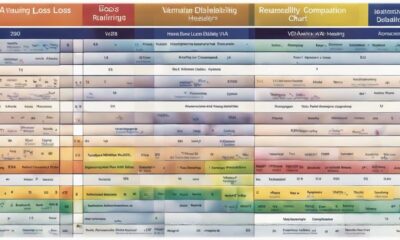
 Navigating the VA System2 months ago
Navigating the VA System2 months agoVA Hearing Loss Rating Chart: Understanding Disability Compensation
-
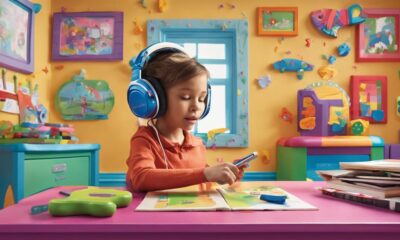
 Therapies and Interventions2 weeks ago
Therapies and Interventions2 weeks ago10 Auditory Processing Goals for Effective Speech Therapy
-

 Vetted2 months ago
Vetted2 months ago15 Best Oticon Hearing Aids to Improve Your Hearing in 2024
-

 Navigating the VA System1 month ago
Navigating the VA System1 month agoUnderstanding Bilateral Hearing Loss VA Rating Criteria
-
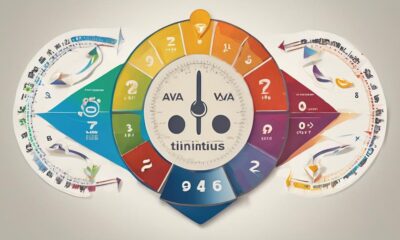
 Tinnitus2 months ago
Tinnitus2 months agoVA's Rating System for Tinnitus and Hearing Loss Explained
-
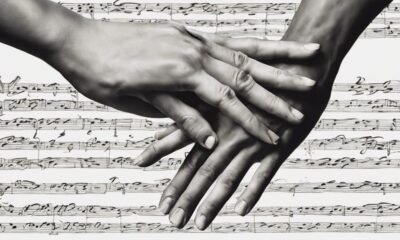
 Sign Language2 weeks ago
Sign Language2 weeks agoMastering the Art of Signing Letters in Sign Language
-
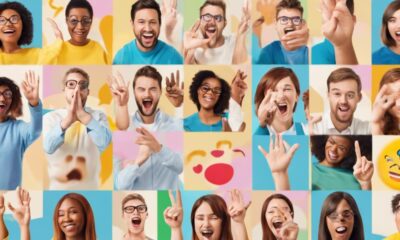
 Sign Language3 weeks ago
Sign Language3 weeks agoSign Language Emoji Translator: How to Communicate With Gestures
-

 Sign Language3 months ago
Sign Language3 months agoMedical Sign Language PDF: A Comprehensive How-To Guide
